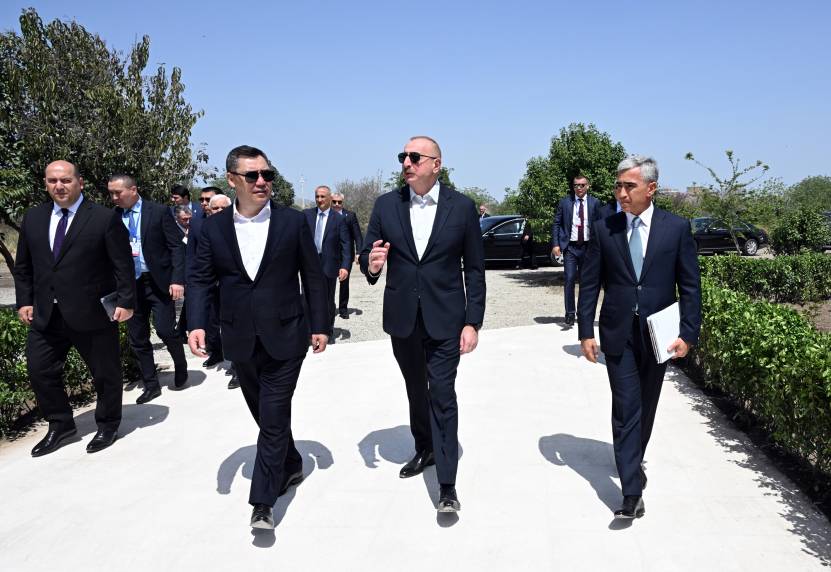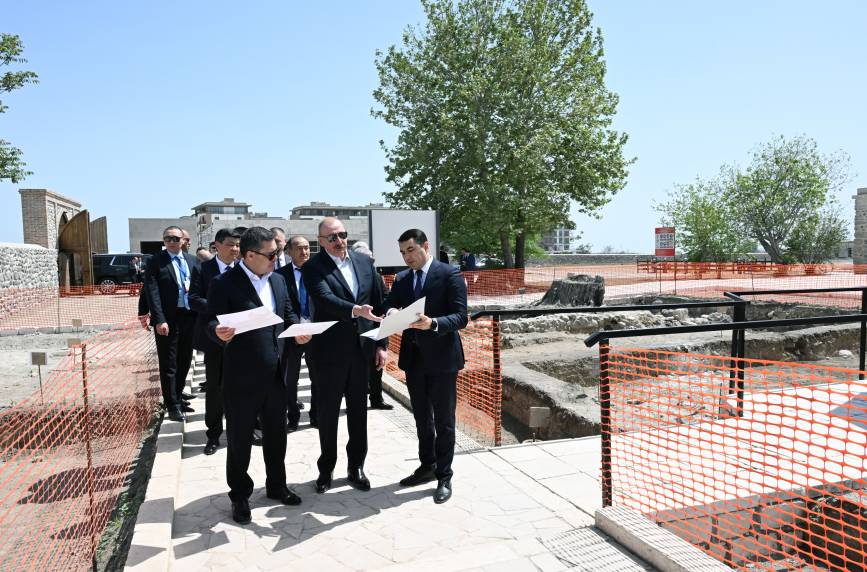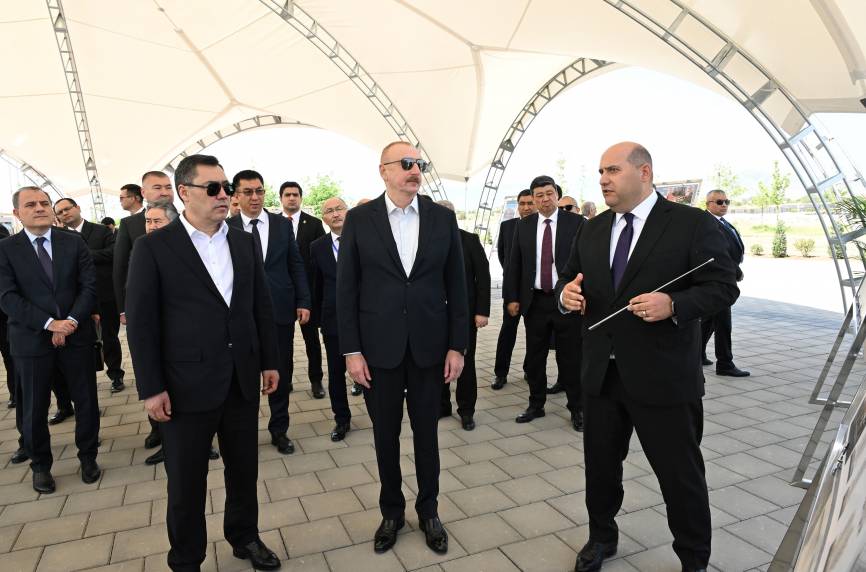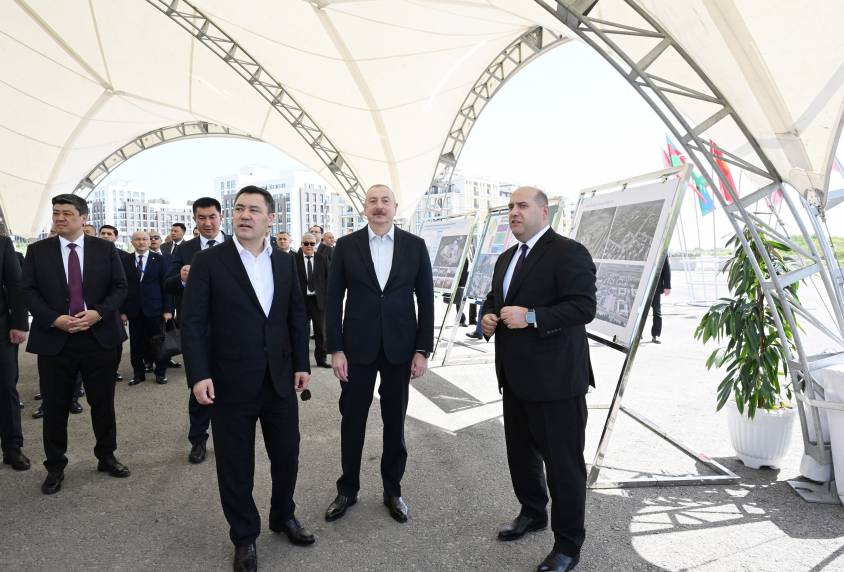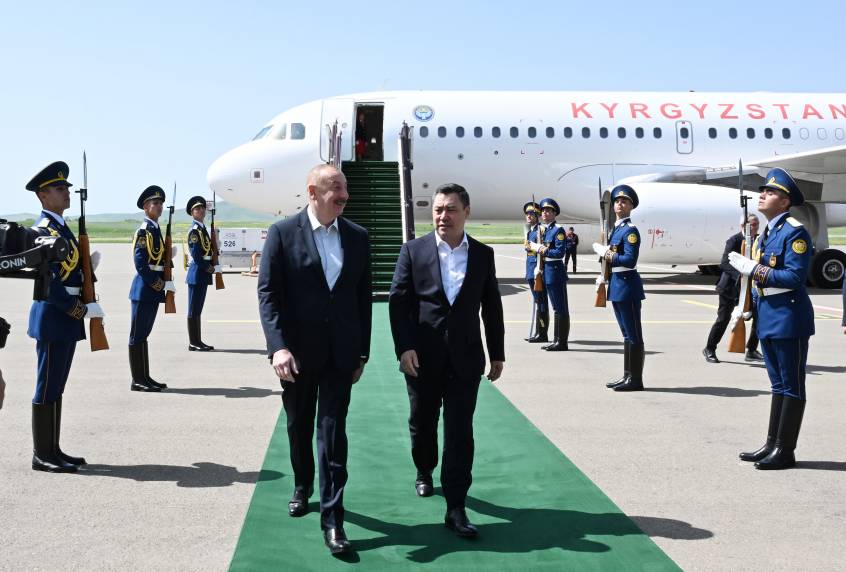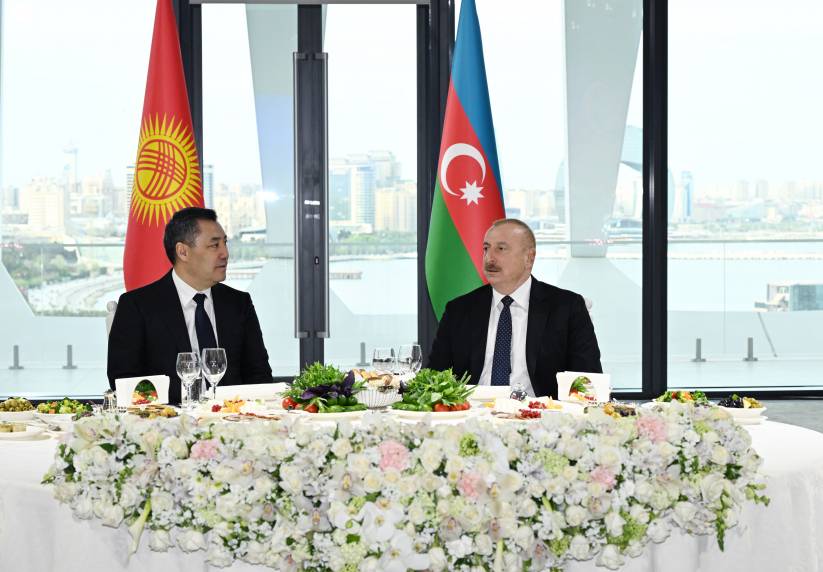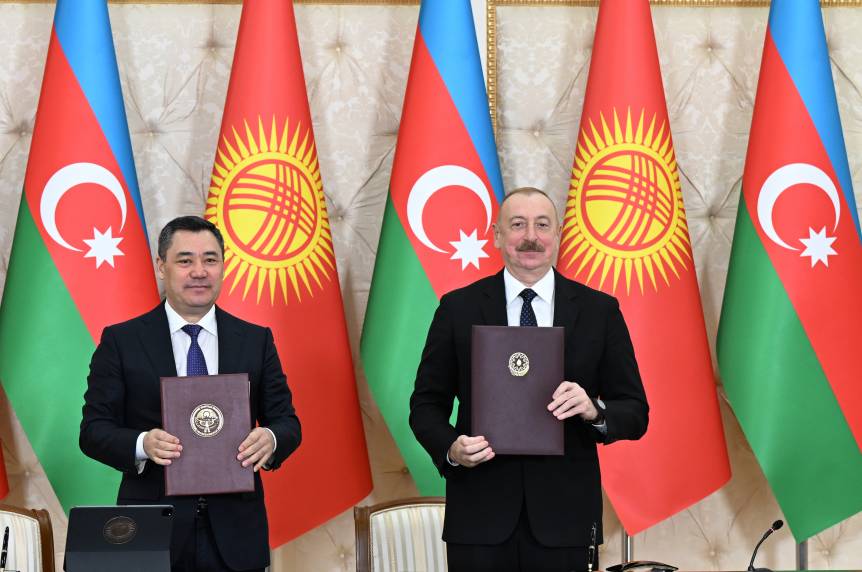13:44
Ilham Aliyev, President of the Republic of Azerbaijan, and Sadyr Zhaparov, President of the Kyrgyz Republic, visited Shahbulag Castle in Aghdam.
25 April 2024, 13:44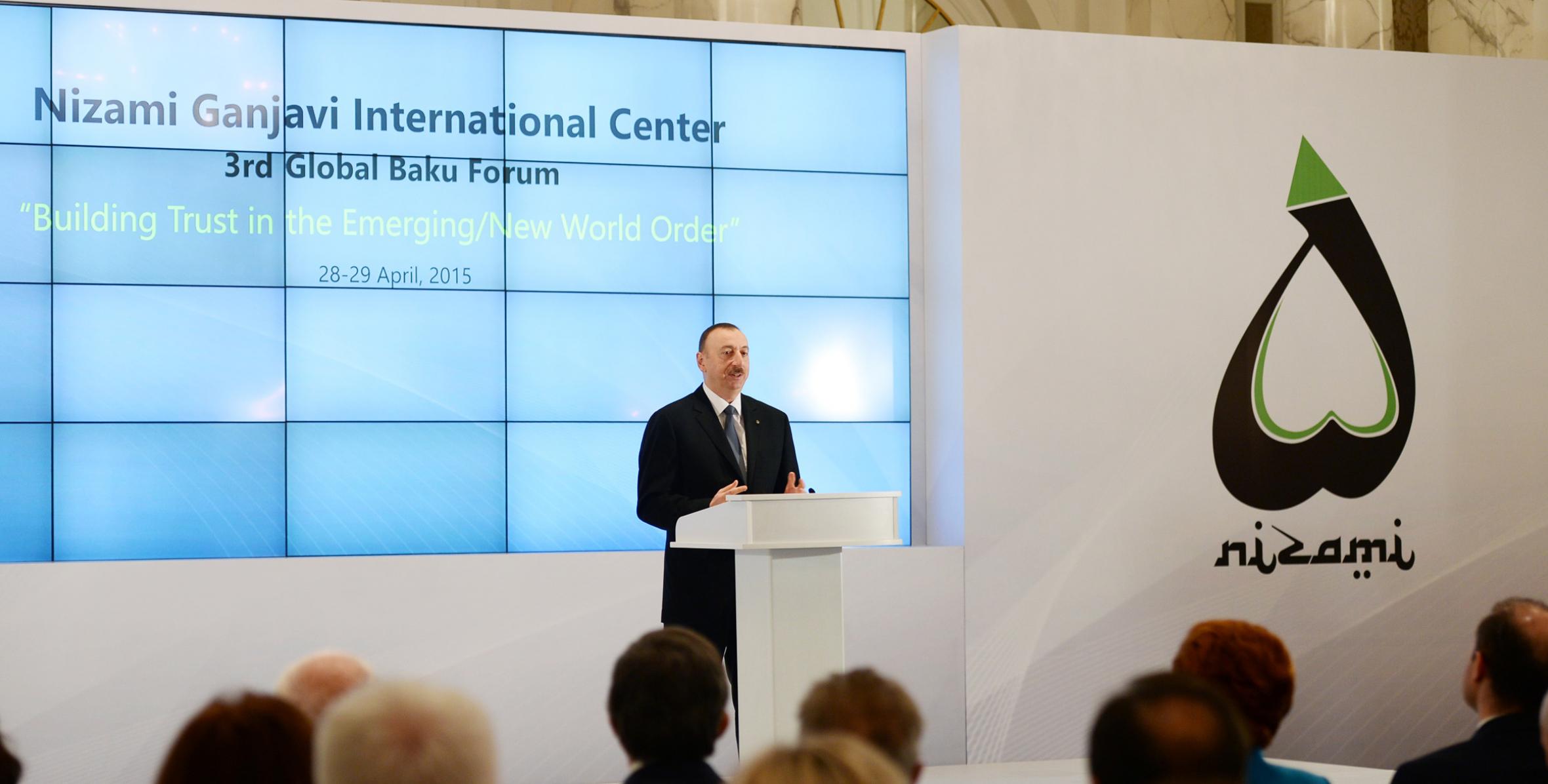
The 3rd Global Baku Forum has started in the capital of Azerbaijan.
President of the Republic of Azerbaijan Ilham Aliyev attended the opening ceremony of the forum.
Organized by the Nizami Ganjavi International Centre in partnership with the State Committee on Work with Diaspora, the forum is titled “Building Trust in the Emerging World Order”.
The event was opened by director of the Bibliotheca Alexandrina, co-chair of the Nizami Ganjavi International Center Ismail Serageldin.
The head of state made a speech at the forum.
Speech by President Ilham Aliyev:
Dear ladies and gentlemen, dear guests,
I`d like to greet you all in Azerbaijan and say welcome to all of you. I am very glad that today here in Baku we organize such an important, remarkable, international event with the participation of the representatives of more than 60 countries. Acting and former presidents, prime ministers, politicians, statesmen, public figures will address here in Baku important issues of world politics. Their views are based on their valuable knowledge and experience. I think it is a unique opportunity having such a high-class representation to discuss what we are facing in the coming years, what are the challenges, what are the ways, how to reduce tensions, which we now see all over the world.
I am very glad and proud that the centre, which transformed in a very short period of time into an important international institution, carries the name of the great Azerbaijani Nizami Ganjavi. It is very difficult to find any Azerbaijani who is not proud of Nizami. I`d like to express my gratitude to the co-chairs of Nizami Ganjavi International Centre Madam President Vaira Vike-Freiberga and Mr. Serageldin for their remarkable activity and contribution to creation of a world class international institution. I am sure that Nizami Ganjavi International Centre will play an even more important role in addressing important issues of world politics, trying to find ways of how to move forward, how to reduce tensions, how to create, and building a better environment for cooperation and mutual understanding.
I am also glad that Nizami Ganjavi International Centre organizes from time to time its events in the ancient city of Azerbaijan, Ganja, the homeland of Nizami. The centre transformed from an institution which addresses primarily humanitarian issues into an institution which addresses all the issues of today`s world politics, economic development, social problems, and issues related to the conflict resolution. Of course, a humanitarian segment plays an important role from this point of view.
Azerbaijan, for centuries, was a place where civilizations met. Our geographic location plus historical legacy of our nation created a special atmosphere in Azerbaijan. Azerbaijan is a natural geographic bridge between Europe and Asia, and now it is a cultural and, I am sure, a political bridge between Europe and the Muslim World. The traditions of multiculturalism have very deep roots in our society. Regardless of the form of political structure all the representatives of different nationalities, ethnic groups, religions have always lived in peace and dignity in our country. That’s why now when Azerbaijan is independent it already became one of the world centres of multiculturalism. Next month we will host the 3rd international Intercultural Dialogue Forum.
Every year we organize International Humanitarian Forum, which primarily addresses the issues of peaceful co-existence, building trust and reducing tensions between different countries of the world. But as an independent country, despite the great history, culture, as an independent country Azerbaijan has existed something for more than 20 years and these were the remarkable years of transformation.
What we achieved today clearly shows that only during a period of independence our people can achieve great success, can themselves determine their future, can themselves plan what to do and how to position themselves in the world and achieve great economic transformation and success.
Yes, Azerbaijan has always been a country blessed with energy resources. But at the same time we remember that at the time when Azerbaijan was not independent, we could not enjoy the benefits of these resources. In the beginning of the 20th century Azerbaijan produced more than half of the world`s oil. And if you look at the pictures of those days you will not see prosperity, equality and social well-fare. During the Soviet time, particularly during the time of the Second World War, the oil of Azerbaijan played one of the most important roles in the fight against fascism. More than 70 percent of oil of the Soviet Union came from Azerbaijan. But when we became independent we saw ecological catastrophe, we saw devastation of oil industry, we saw economic and industrial stagnation. So only during independence in a very short period of time when our tale is in our hands we manage to achieve success. That was a challenging period because not only we had to build the state and create the foundation of the statehood, but also transform completely the political and economic system from plant economy to market economy, from one party-system to multiple-party system, from totalitarism to democracy.
I think that the implementation of political and economic reforms in parallel provided the rapid transformation, stability, predictability and economic and social development. Today Azerbaijan enjoys all the freedoms. We are a free society, all the freedoms are fully provided, freedoms of media, we have free Internet without any censorship, freedom of expression, freedom of assembly, religious freedom. Political transformation continues. We still need to work more on the improvement of our legal system because justice in the society, justice in the family, justice everywhere is one of the most important elements for normal development and for stability of any society. Also Azerbaijan managed to position itself on international map. Our country is a member of Council of Europe and member of Islamic Cooperation Organization. It is one of the very few countries to be a member of both organizations.
Azerbaijan has a very strong position in these organizations and plays its important role in bringing closer the countries of different history, different traditions and culture. Azerbaijan is also a member of the Movement of Non-Alignment, and that is also is an indicator of our priorities. We were proud to be elected to the United Nations Security Council several years ago with the support of 155 countries which clearly shows that the absolute majority of the international community supports Azerbaijan, trusts Azerbaijan and expresses its position during this important voting procedure.
When we were elected to the United Nations Security Council, which is the world`s leading international body, we made it very clear that we will defend justice and international law. Unfortunately international law is no longer something which all the countries respect. Unfortunately, but this is the reality. It seems sometimes that international law is obligatory only for countries which are not strong enough to achieve their goals by different means. The leading countries of the world from time to time and, we see it very clearly, brutally violate international law norms and this, actually, undermines the whole construction of the post-war international relations system.
I think this is one of the most important issues which we need to address very openly, clearly and to try to use our opportunities, intellectual potential and the influence in the world in order to strengthen the system of international relations which exists, strengthen international law and we need to respect the resolutions of international organizations. In some cases, resolutions are being implemented immediately, I mean resolutions of the Security Council of United Nations. In other cases they are not implemented for years and for decades.
And here comes a contradiction in international law with political interests and political priorities. That leads to frustration, a situation where double standards become a rule and not an exception. We as a country know how painful it is because we are suffering from double standards, we are suffering from brutal violation of international law.
And as you know the occupation by Armenia of internationally recognized and historic territories of Azerbaijan continues for many years regardless of four United Nations Security Council resolutions which demand immediate and unconditional withdrawal of Armenian troops from Azerbaijani territories. Nagorno-Karabakh is a historic part of Azerbaijan, integral part of Azerbaijan and no country in the world recognized this illegal Nagorno-Karabakh as an independent entity.
We suffered from occupation as almost 20 percent of our territories is still under occupation and more than one million Azerbaijanis became refugees and internally displaced on their own lands.
We suffered from ethnic cleansing, from Khojaly genocide, which is recognized already by more than 10 countries, and this process continues.
Territorial integrity is a fundamental principle of international law. It is written in the UN chapter, it is one of the most important elements of the international law and it is defined in the Helsinki Final act. And there should be no contradiction. There should be a very clear understanding that the right for self-determination should not violate territorial integrity of countries. And territorial integrity of any country cannot be changed without the consent of the government and people of that country. Territorial integrity of Azerbaijan has the same value as territorial integrity of any other country. Unfortunately we see in different parts of the world that separatism, aggressive separatism, attempts to implement the policy of secession and violation of territorial integrity leads to conflicts. If Nagorno-Karabakh conflict would have been resolved probably today we would not have seen other conflicts.
But Azerbaijan is strongly committed to resolution of this conflict based on the international law norms and United Nations Security Council resolutions. By the way other important national institutions like the European Parliament, Parliamentary Assembly of the Council of Europe, Islamic Cooperation Organization, Non-Alignment Movement adopted similar resolutions and the conflict must be based on the principles of international law, territorial integrity of Azerbaijan.
Of course, it is the biggest problem for our country and also the biggest impediment for our development. But in spite of that Azerbaijan’s development was very successful and during the last 10 years our economy grew more than three times. We managed to diversify the economy and reduce dependence on energy sector. Today, energy sector makes something more than only 30 percent of our GDP so the policy of diversification led to substantial progress and even now with this fall of oil prices Azerbaijan’s economy grew more than 5 percent in the first quarter of this year.
So we managed – through the policy of diversification and investment, creation of modern infrastructure and good business climate – to protect ourselves from the volatility of the oil prices. Azerbaijan is a country open for foreign investments. We received more than 200 billion dollar investment during the years of independence. Last year 27 billion – 30 percent – were direct foreign investment. So for foreign investors Azerbaijan is a very attractive country because we have a very good business climate, investment climate. According to Davos World Economic forum assessment, Azerbaijan’s economy is number 38 in the world with respect to competitiveness. This is again not because of energy resources but because of reforms, because of what has been done in recent years. We managed to almost eradicate unemployment which is now less than 5 percent and poverty drop was dramatic from 49 percent in 2003 to 5 percent in 2015. So economic and political reforms, at the same time, very active social policy and social protection of the people, transparency in accumulating the wealth generated by energy development and transparency in spending state funds, I think, also played a very important role in our development.
In the coming years we will concentrate more on diversification and the areas of attention of our government are modern technologies and agriculture. Azerbaijan is already a country with space industry: we have two satellites and rapid development of space industry in Azerbaijan is an indicator of our plans because our population is growing, our economy is growing and economy should grow faster than population. Otherwise, at certain points we will face difficulties. Therefore reforms should never stop and we should never feel ourselves relaxed because we need to work, to work hard in order to strengthen our statehood, independence. Economic independence allows us to implement independent foreign policy. When you are weak and dependent you will be influenced. No matter by who, but you will be influenced.
By building a strong economy we protected ourselves from any kind of external influence. We want to live our own life. For centuries Azerbaijan was part of empires, other countries. Today when we are free and our people enjoy freedom and they see the advantages of this freedom and independence, we must protect our choice and we will protect our choice. Our choice is democracy, our choice is social welfare, our choice is peace among all the people of Azerbaijan, multiculturalism, inter-religious dialogue and cooperation with all the countries in the world and implementation of the regional and continental projects which will be beneficial to all of us.
As far as energy security is concerned Azerbaijan is playing its important role in diversification of energy supplies. For 20 years we have been implementing the oil strategy which created absolutely new energy map in the region. We connected the Caspian Sea with Black Sea and Mediterranean Sea by multiple oil pipeline system. Today oil from the Caspian Sea – not only of Azerbaijan’s resources, but also from Eastern shores of the Caspian – is being directed to international markets from Azerbaijan.
Now we are implementing the biggest infrastructure project of Europe where Azerbaijan again showed initiative and took the lead, which is called Southern Gas Corridor. It consists of four segments. It is development of one of the biggest gas fields of the World – Shahdeniz. Construction of the new pipeline system to connect Azerbaijan and Georgia – South Caucasus pipeline, Trans-Anatolian pipeline, which will be built - construction has already started all across Turkey - from Eastern to Western border of Turkey, and Trans-Adriatic pipeline – TAP, which will be constructed from the Turkish border through Albania to Italy.
And last Bulgaria. It is also part of our energy policy. From Azerbaijan-Georgia-Turkish trilateral format we transformed into a much bigger format. In the coming years, I am sure, the countries of the Balkan region will join our pipeline system, especially taking into account that inter-connectors have been built now in Europe, which we also fully support because Azerbaijan has huge, enormous gas reserves, infrastructure which is now already in the process of construction. According to our plans, in 2018-2019, all these projects which I already mentioned must be implemented. This is 45 billion dollar investment, very difficult from technical point of view and, of course, we need a broad coordination and cooperation. For that purpose Azerbaijan initiated and held this February the first advisory board of the Southern Gas Corridor.
It allowed all the representatives, high-ranking representatives of the countries, which I named, plus high representatives of the United States and European Commission to address this issue. We adopted a joint press statement where the leading role of Azerbaijan is purely identified. This is part of our cooperation with European Union. But not the only one, though, of course, it is important. We understand that for Europe energy diversification is really the issue of, I would say, national security and we should treat this issue particularly like that. Energy security cannot be separated from national security. Another important issue is diversification of sources. Diversification of routes is also important. But when the sources are the same it doesn’t makes sense. In our case it is diversification of sources and the only new source for Europe of natural gas is Azerbaijan. Of course, I am not trying to say that other sources are not important and we are not trying to compete with anyone, but other sources are already in action. The only new is Caspian, Azerbaijan and here we play, I think, and will continue to play a very important role.
At the same time, we have a format of cooperation European Union and next month in Riga there will be a regular summit of Eastern Partnership. Azerbaijan is an active participant of this program, and, I’d like to say, in the meantime, we strengthen our bilateral ties with member states of EU. Azerbaijan already signed either agreements or adopted joint statements on strategic partnership with seven EU member states. This is one fourth of EU members and, I think, that in the coming years there should be a more differentiated approach from European institution towards the members of the Eastern Partnership program because there are different countries with different aspirations and different level of economic development. Therefore, I think, the most appropriate format for us would be strategic partnership which will reflect the substance of our relations and of our future.
To conclude I would like to say a couple words on the issue which is now one of the most priority issues for us, which is education. Education is knowledge, education is future, education is for us modernization. We are lucky to have almost hundred percent literacy in Azerbaijan. Our government spends every year at least 40 million euros to train our young people abroad in the leading universities in the world. Education is also protection from radicalization and this is also important for a country which is situated in this region. Protection against radicalization, of course, is stability and justice in the society. It is economic development, eradication of poverty and unemployment. Poverty, unemployment, social, political injustice they feed radicals and they are the instruments which radicals use in order to brainwash young people and recruit them for their purposes.
Therefore for us education means protection from radicalization, it means modernization, development. This is how we want to see Azerbaijan in the future and we have a complete consensus in our society with respect to how Azerbaijan should develop. It should develop on the path of freedom, democracy, economic, social, progress, good relations with all our partners in order to strengthen our independence and protect our choice.
Once again dear friends, welcome to Azerbaijan. I wish the conference success. Thank you.
X X X
Then President of Bulgaria Rosen Plevneliev, President of Macedonia Gjorge Ivanov, and Prime Minister of Malta Joseph Muscat addressed the meeting.
The event heard addresses by German Chancellor Angela Merkel, Prime Minister of the United Kingdom David Cameron, former Secretary General of the United Nations Boutros Boutros-Ghali, and former US Secretary of State Henry Kissinger.
Then former President of the Republic of Latvia, co-chair of the Nizami Ganjavi International Center Vaira Vike-Freiberga made a speech.
The forum will feature discussions on a range of topical global issues, including ethnic and other conflicts, terror threats, development of democracy, education, environment, energy security, inter-religious dialogue, and the role of women in maintaining peace.
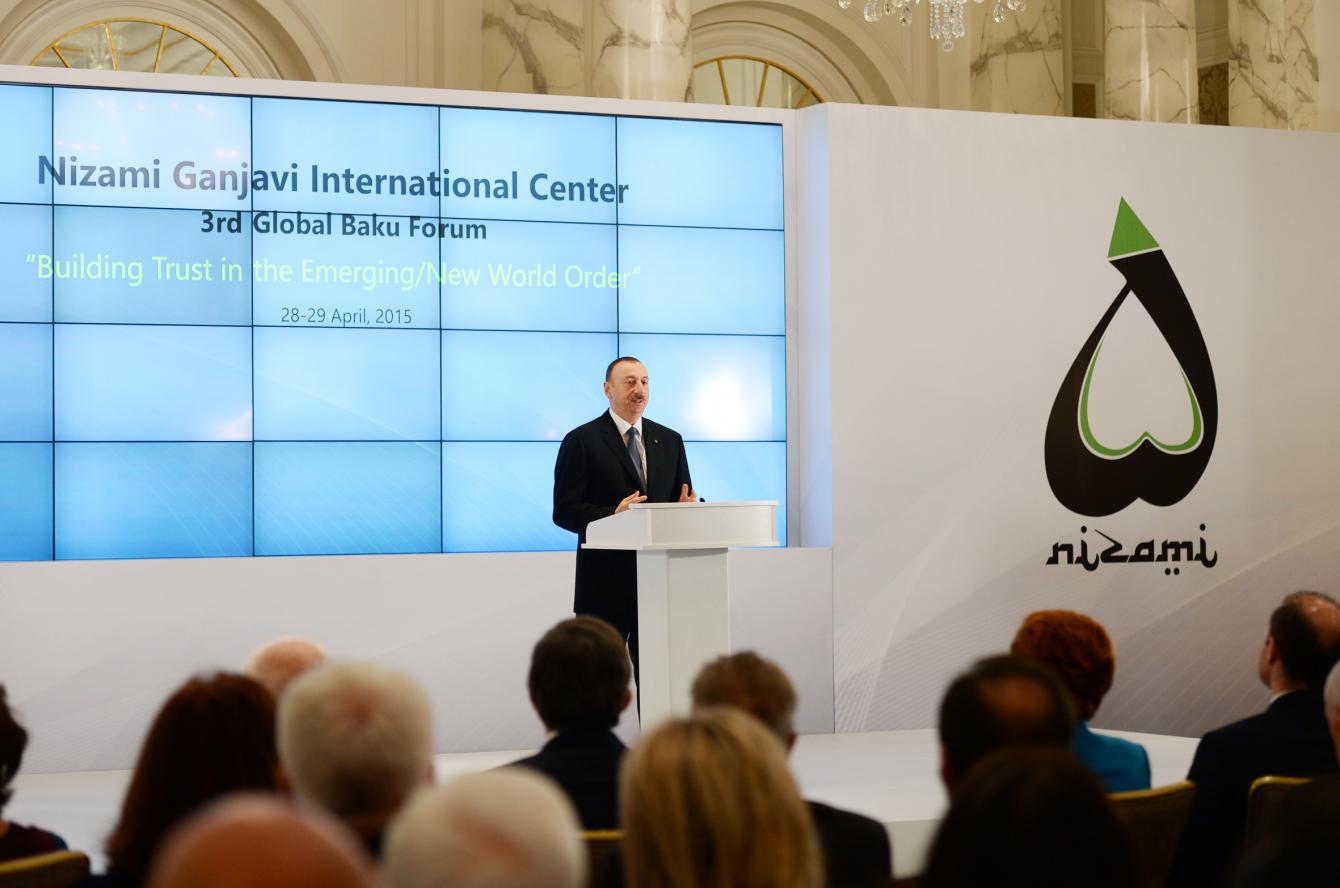
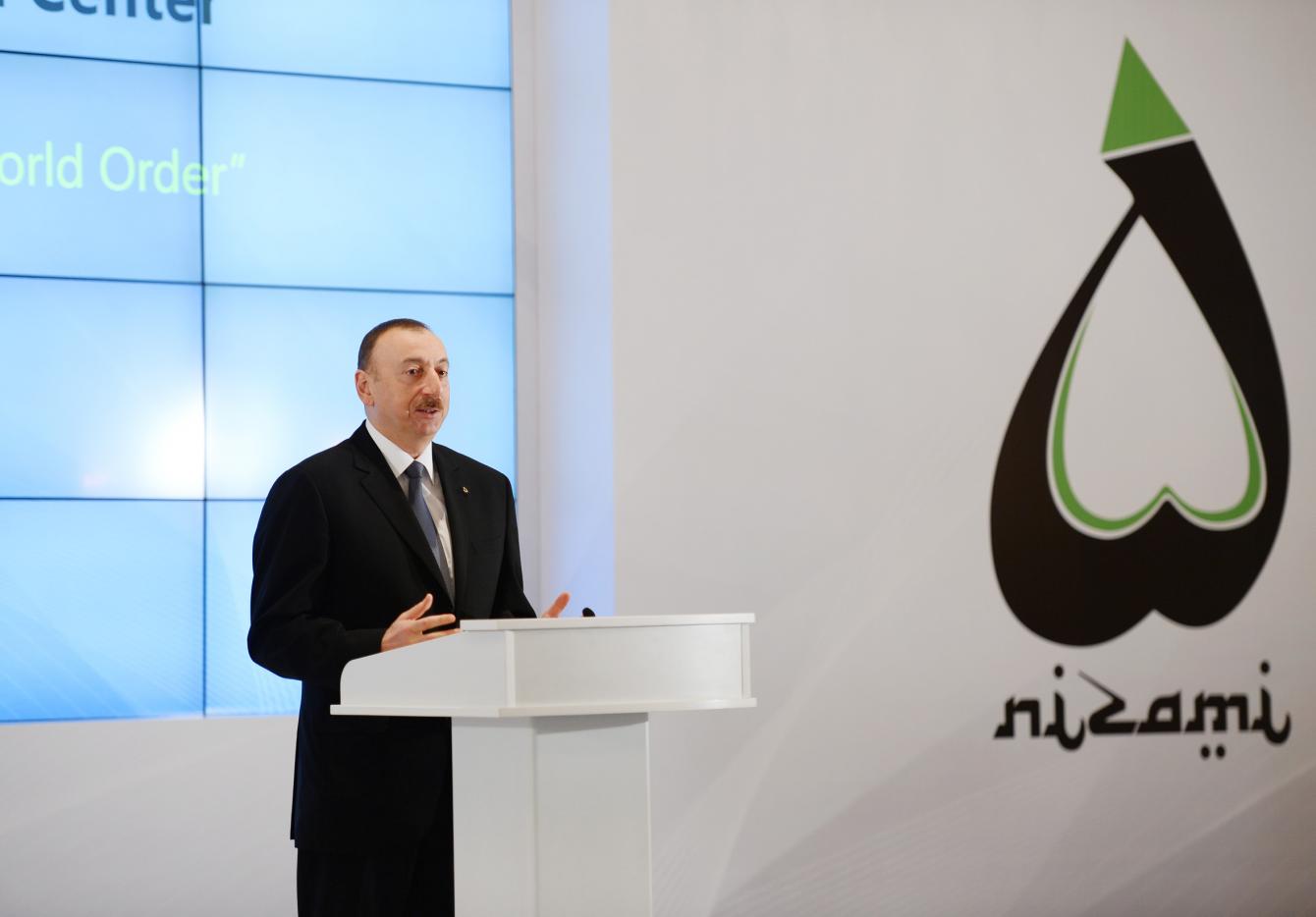
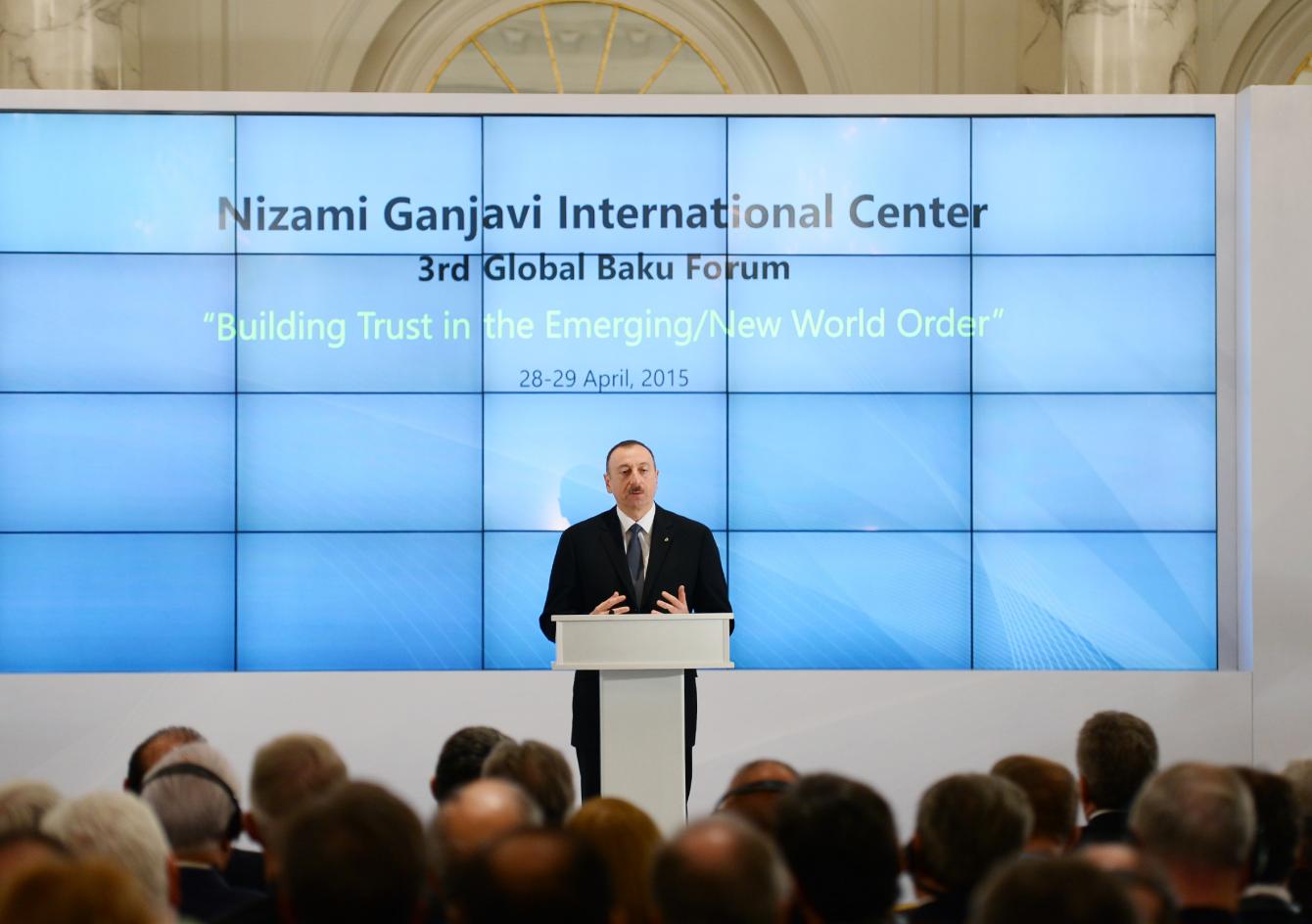
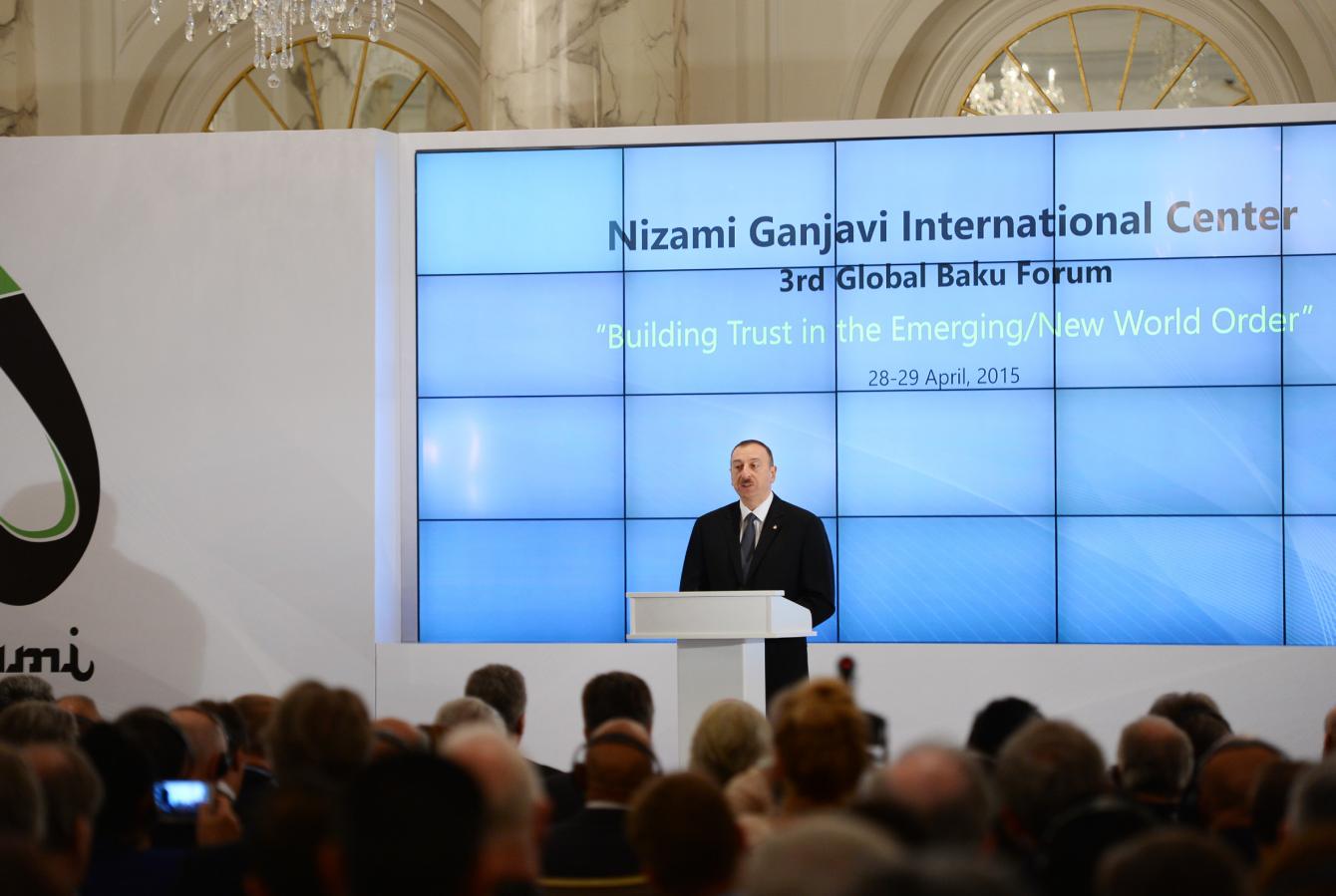
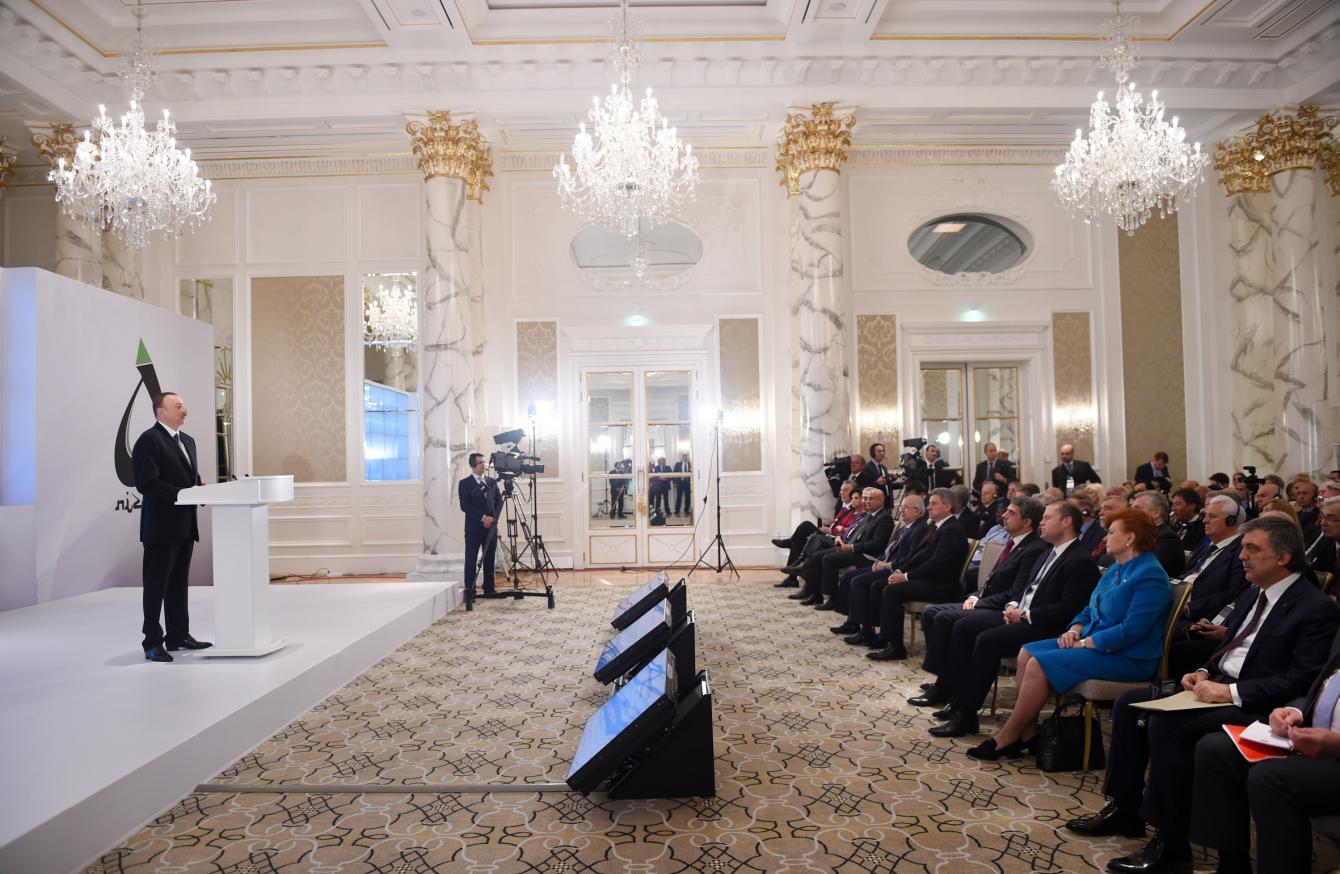
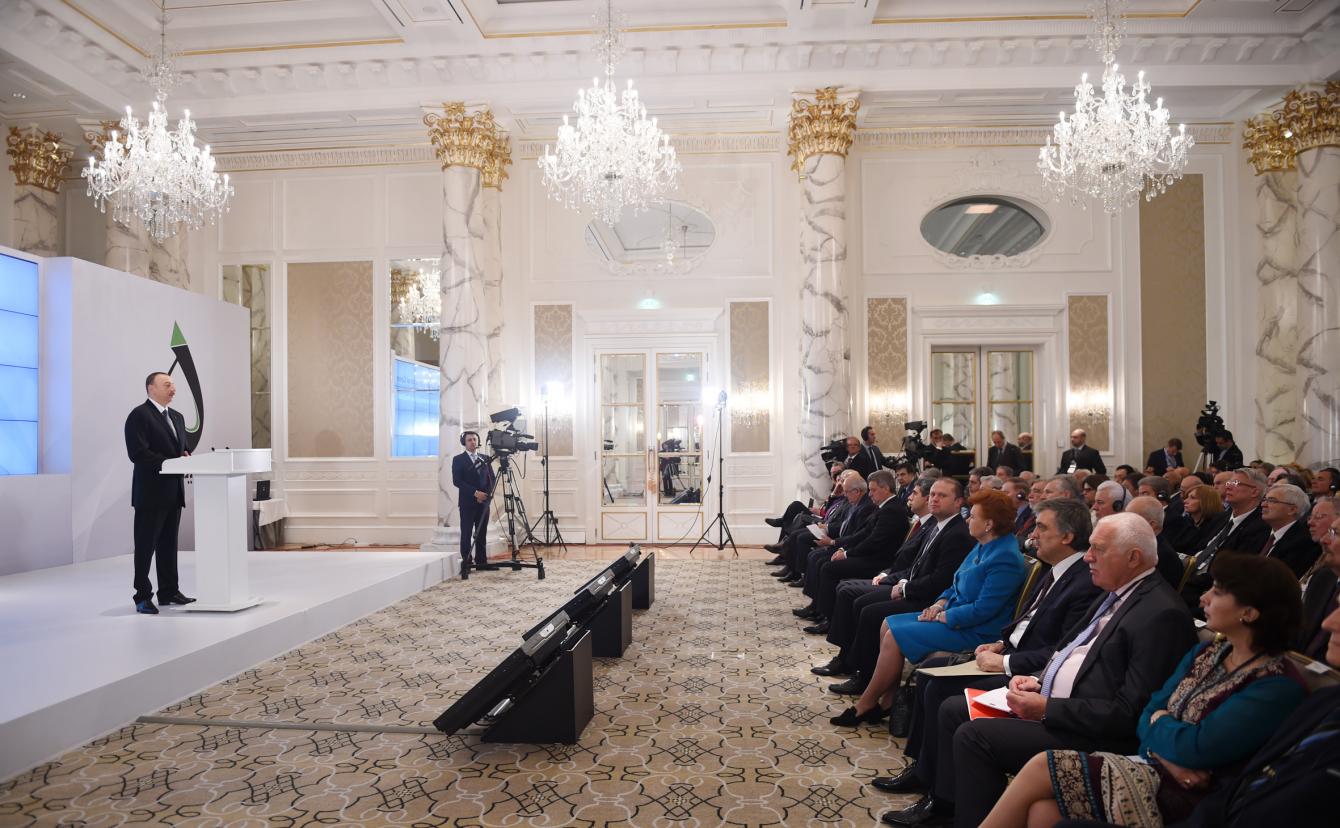
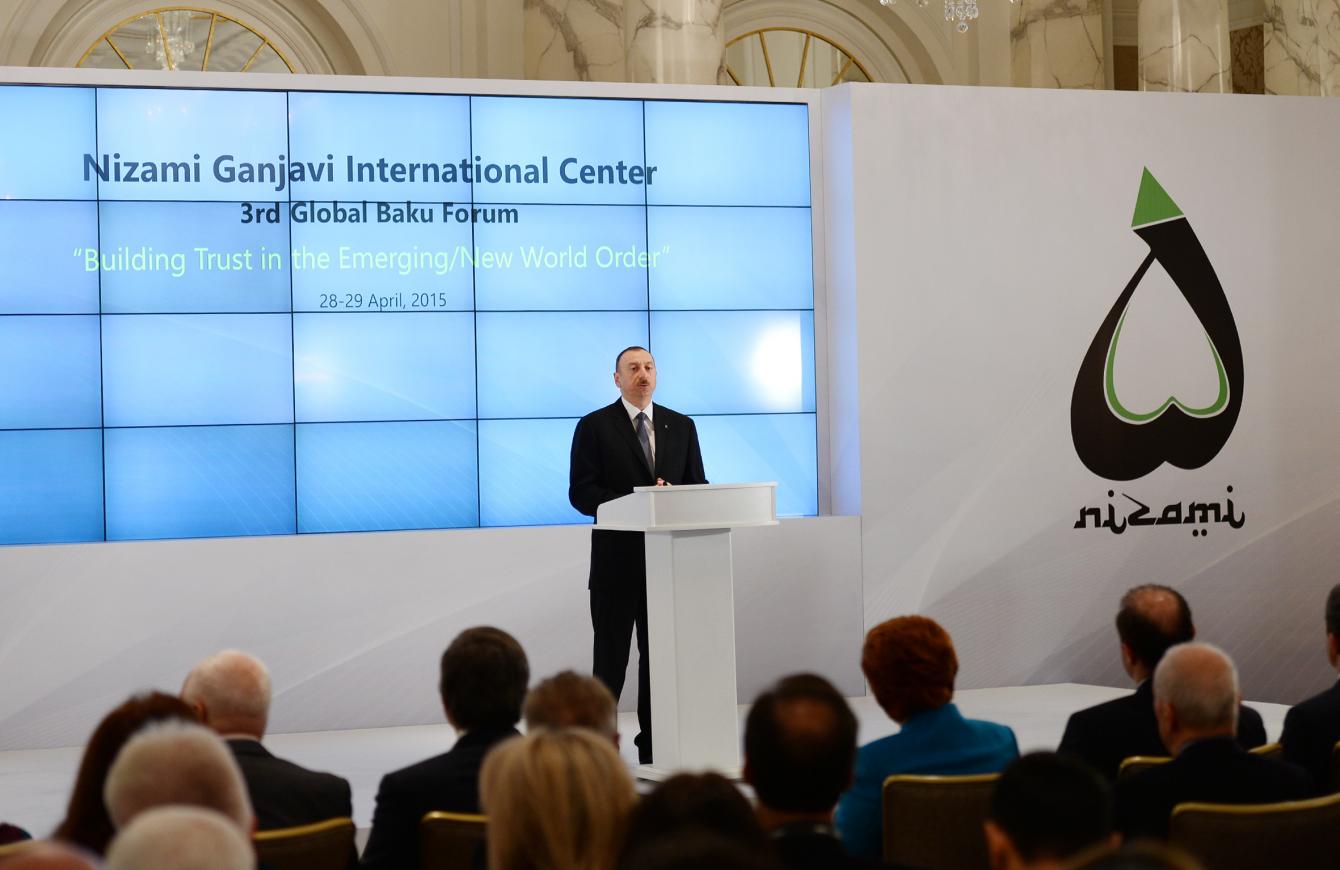
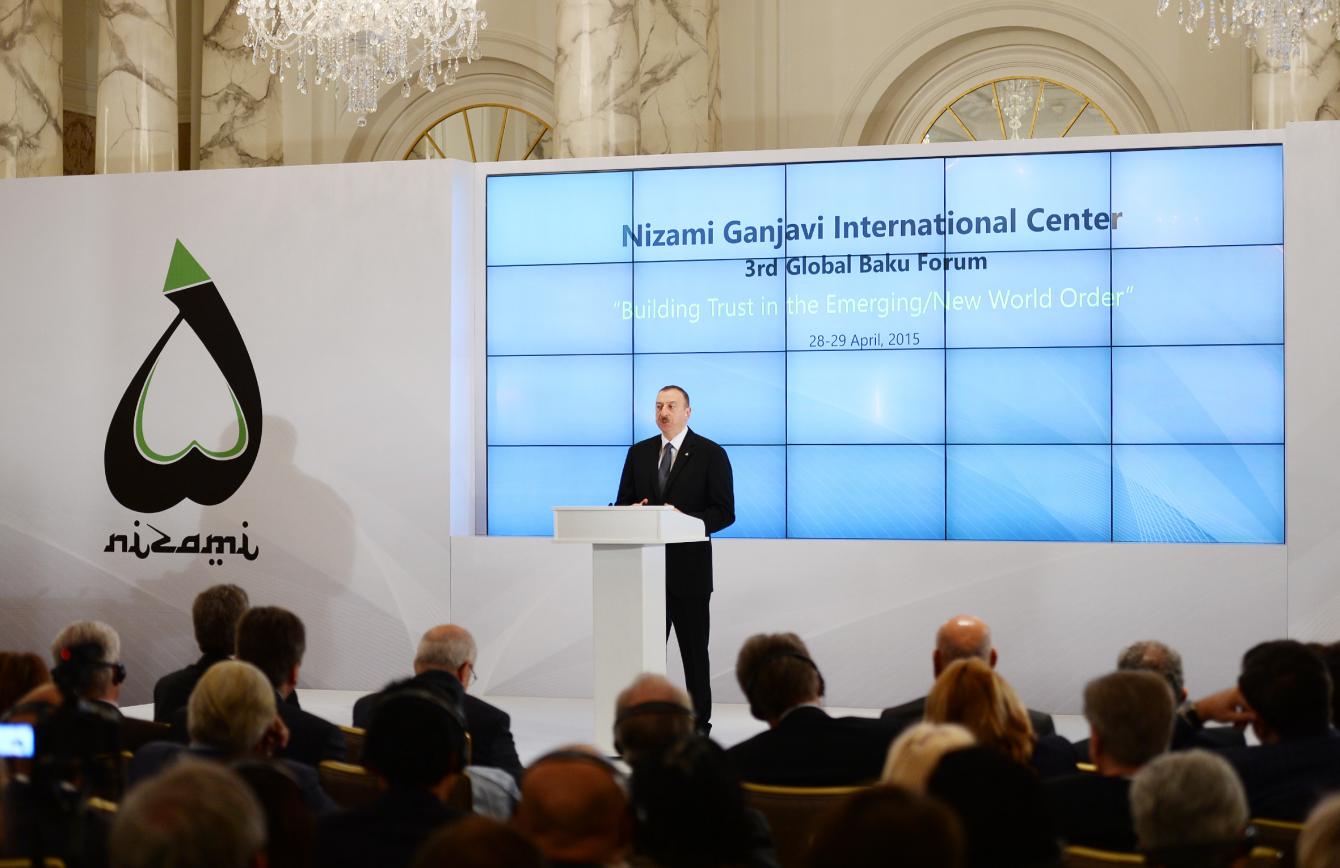
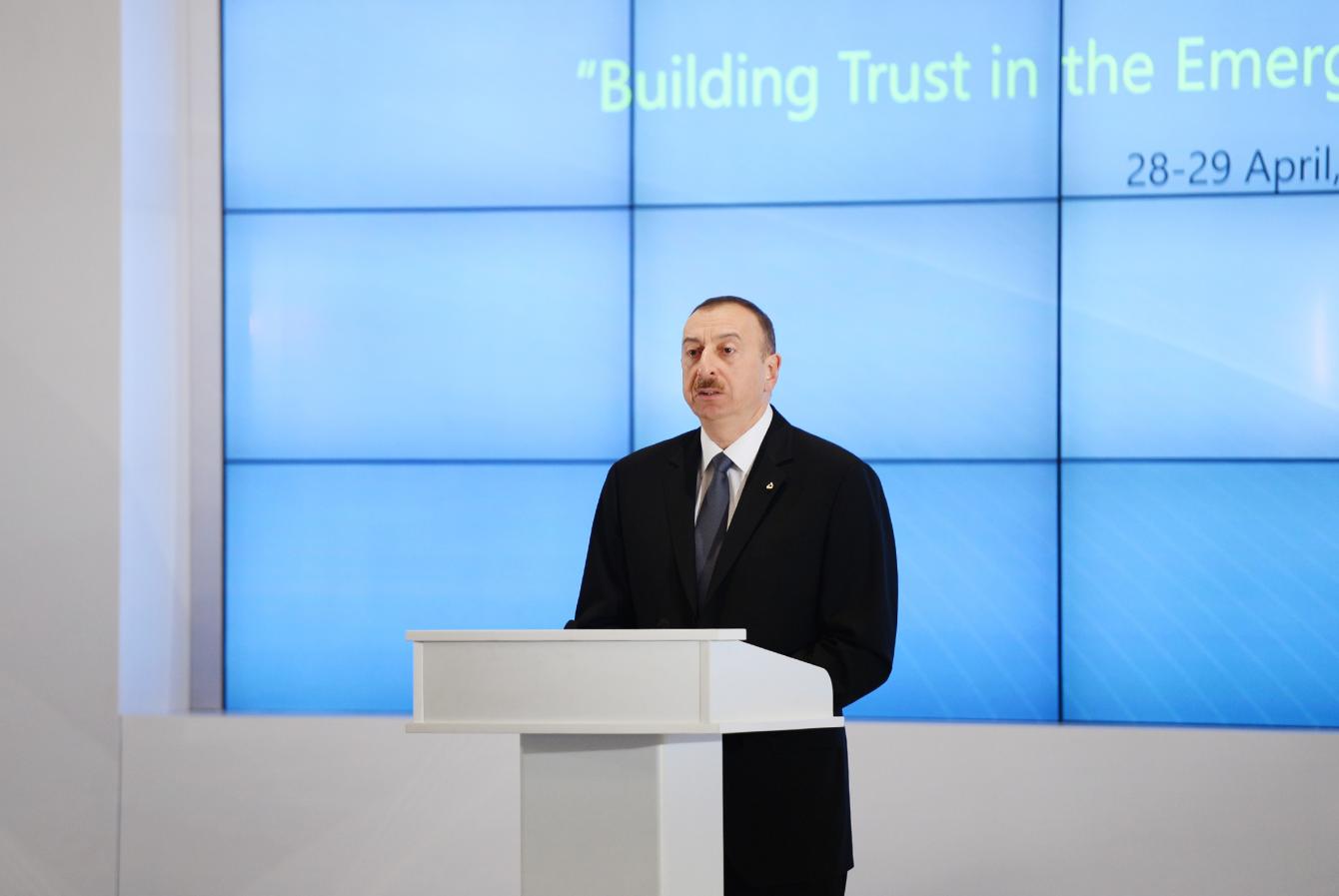
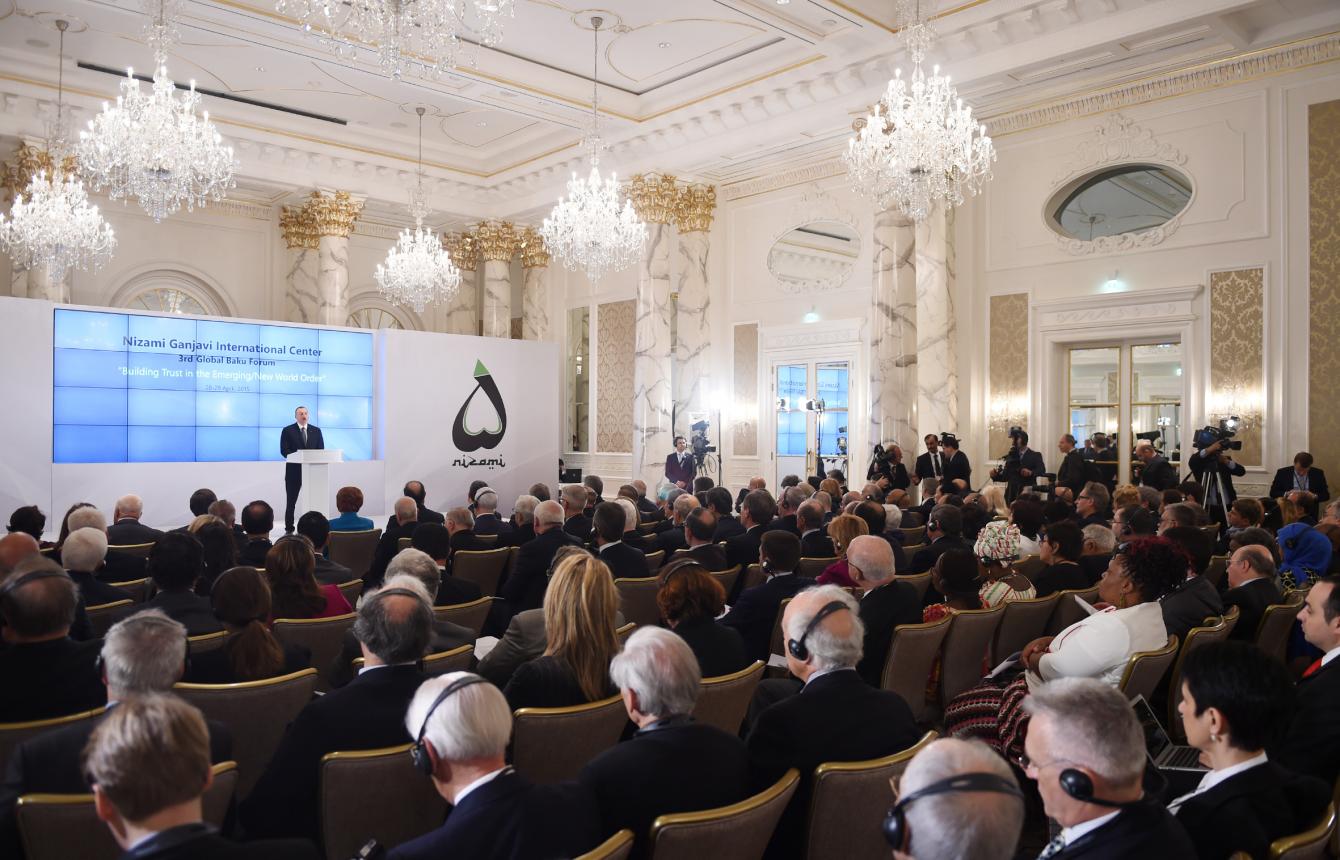
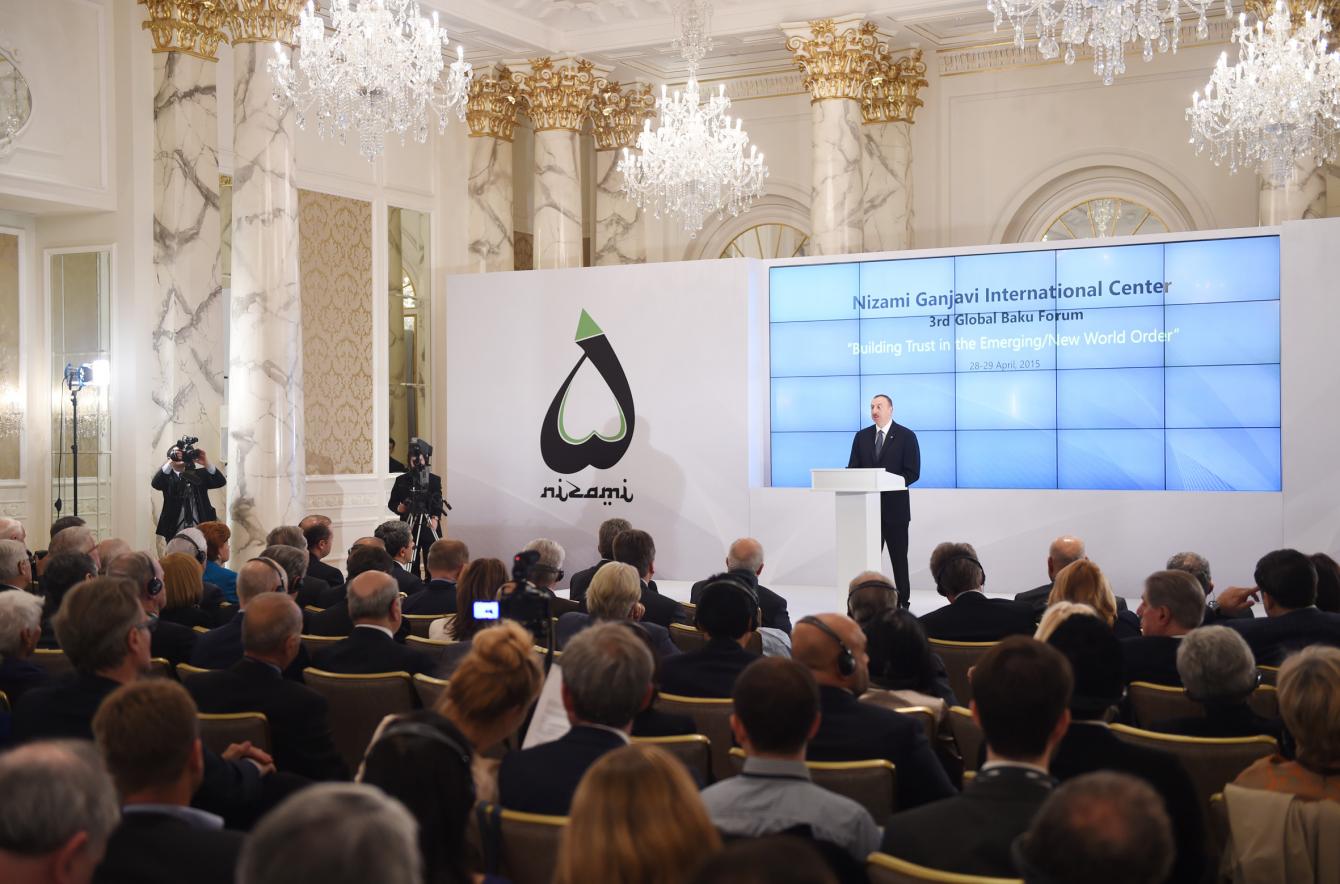
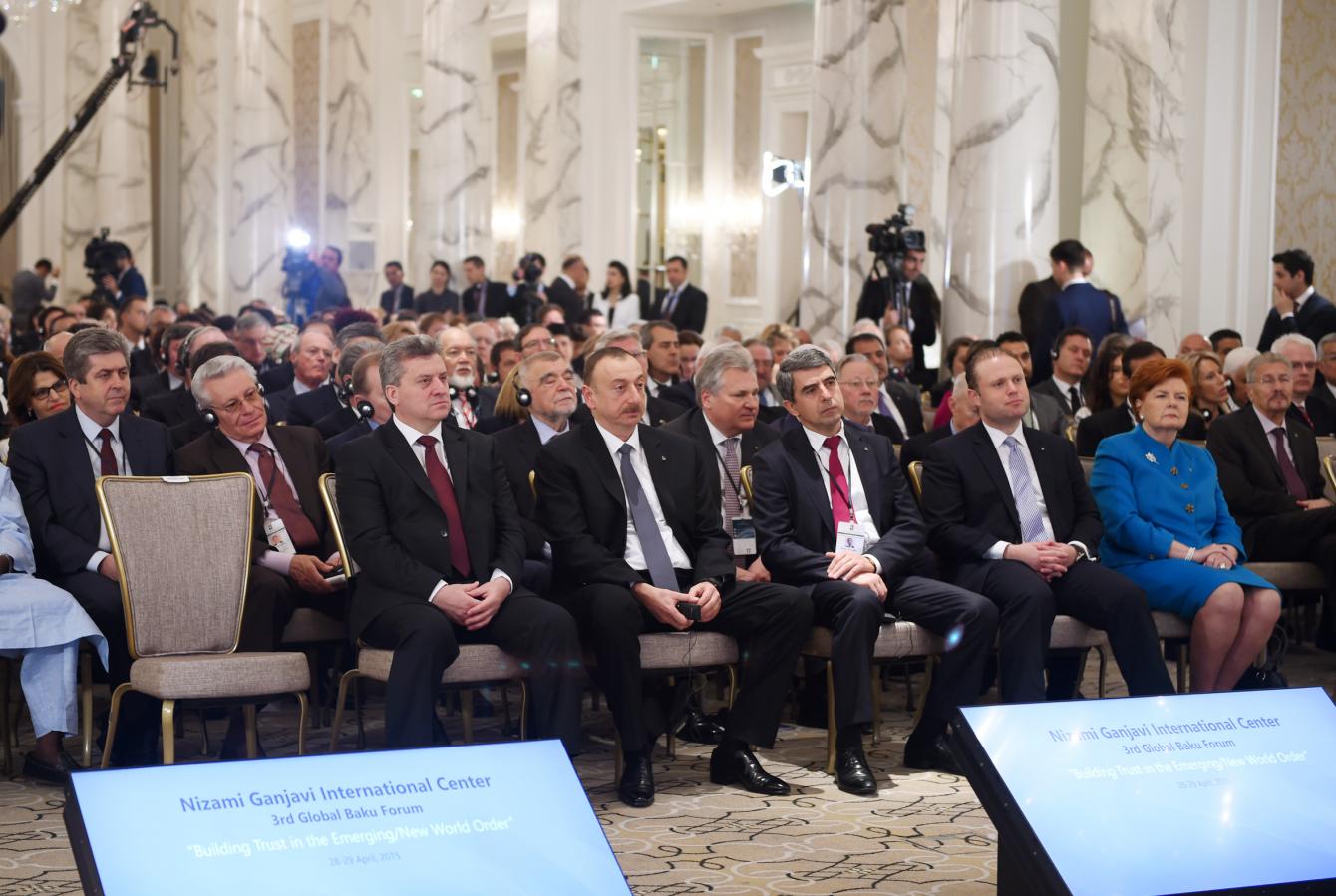
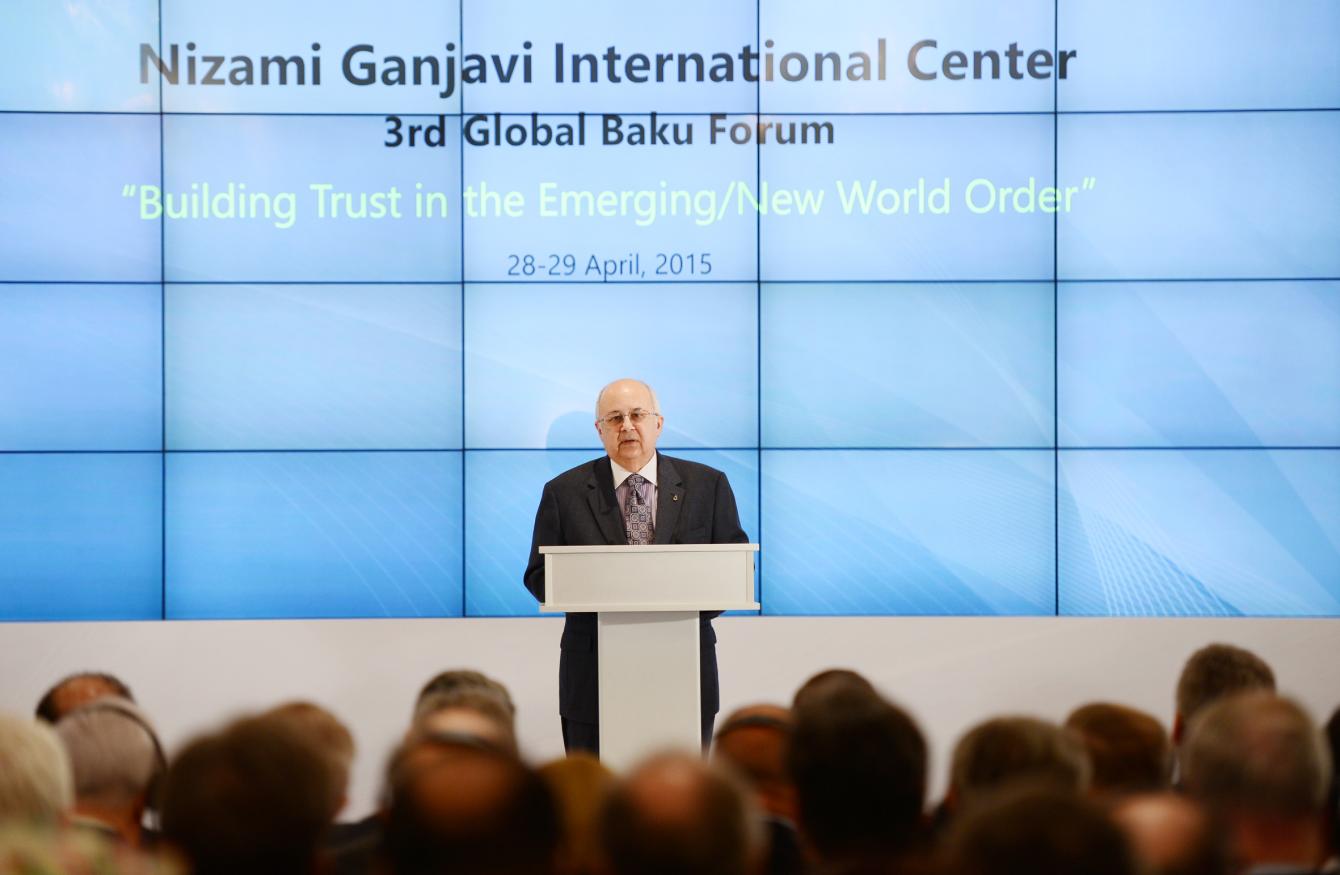
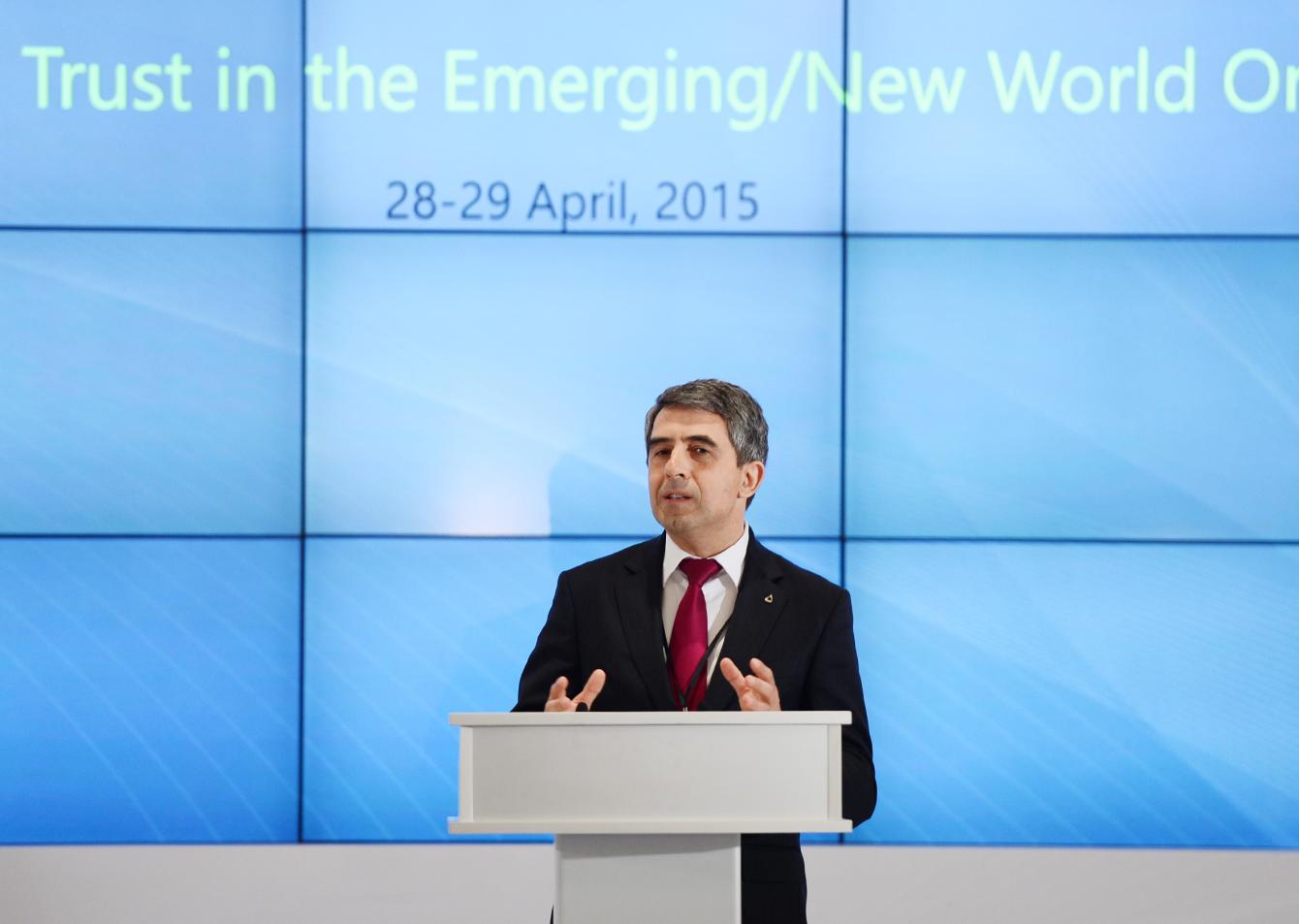
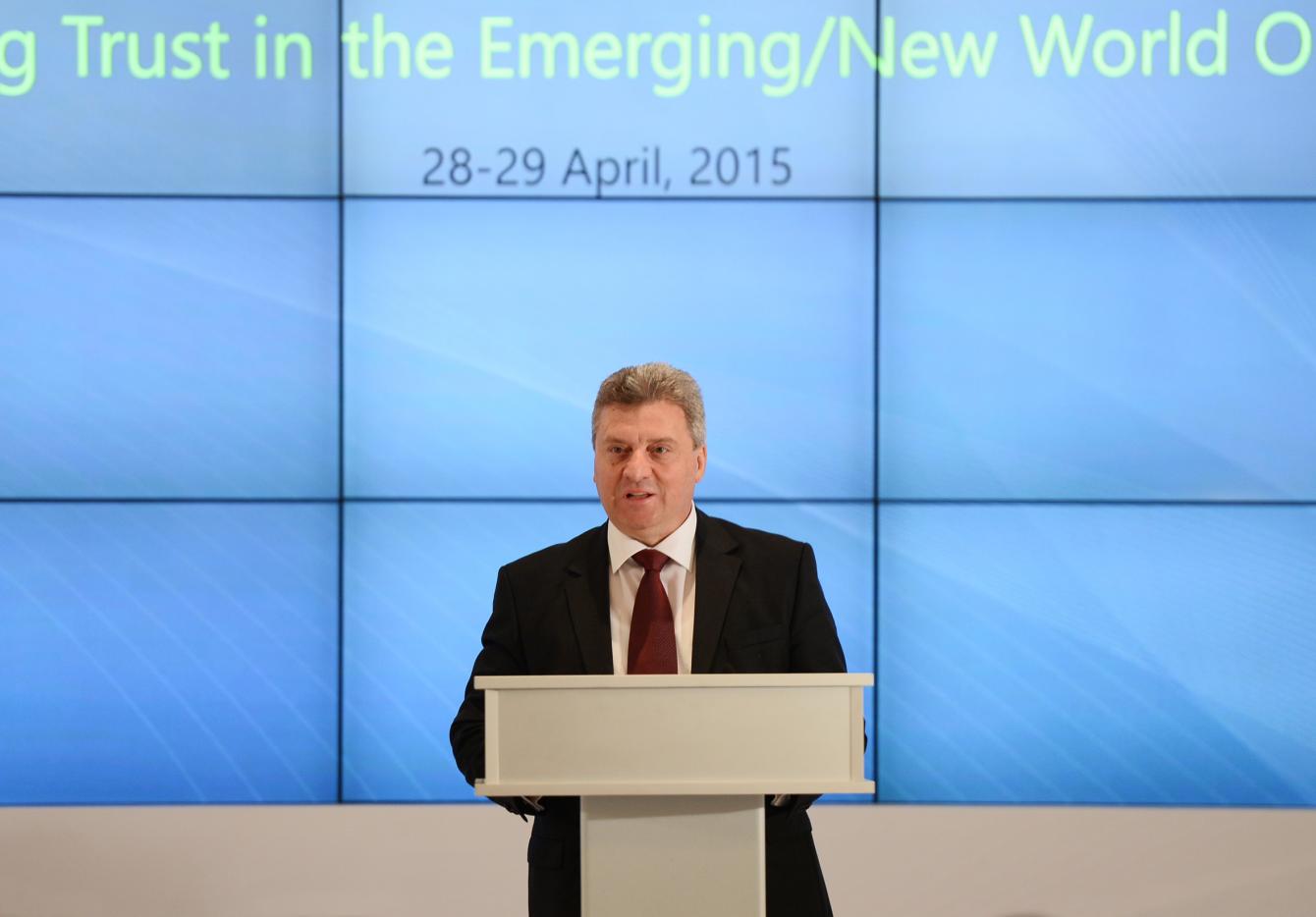
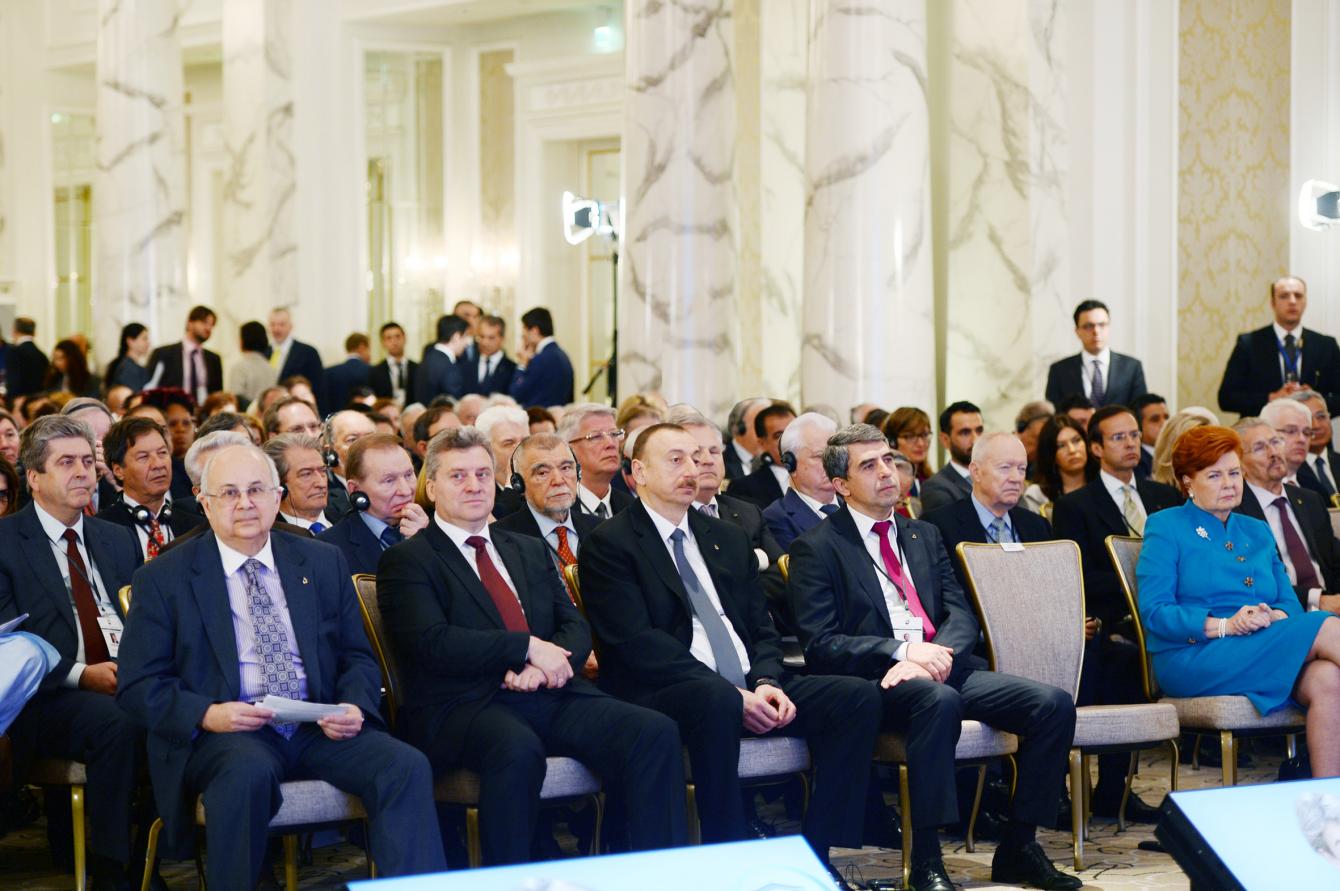
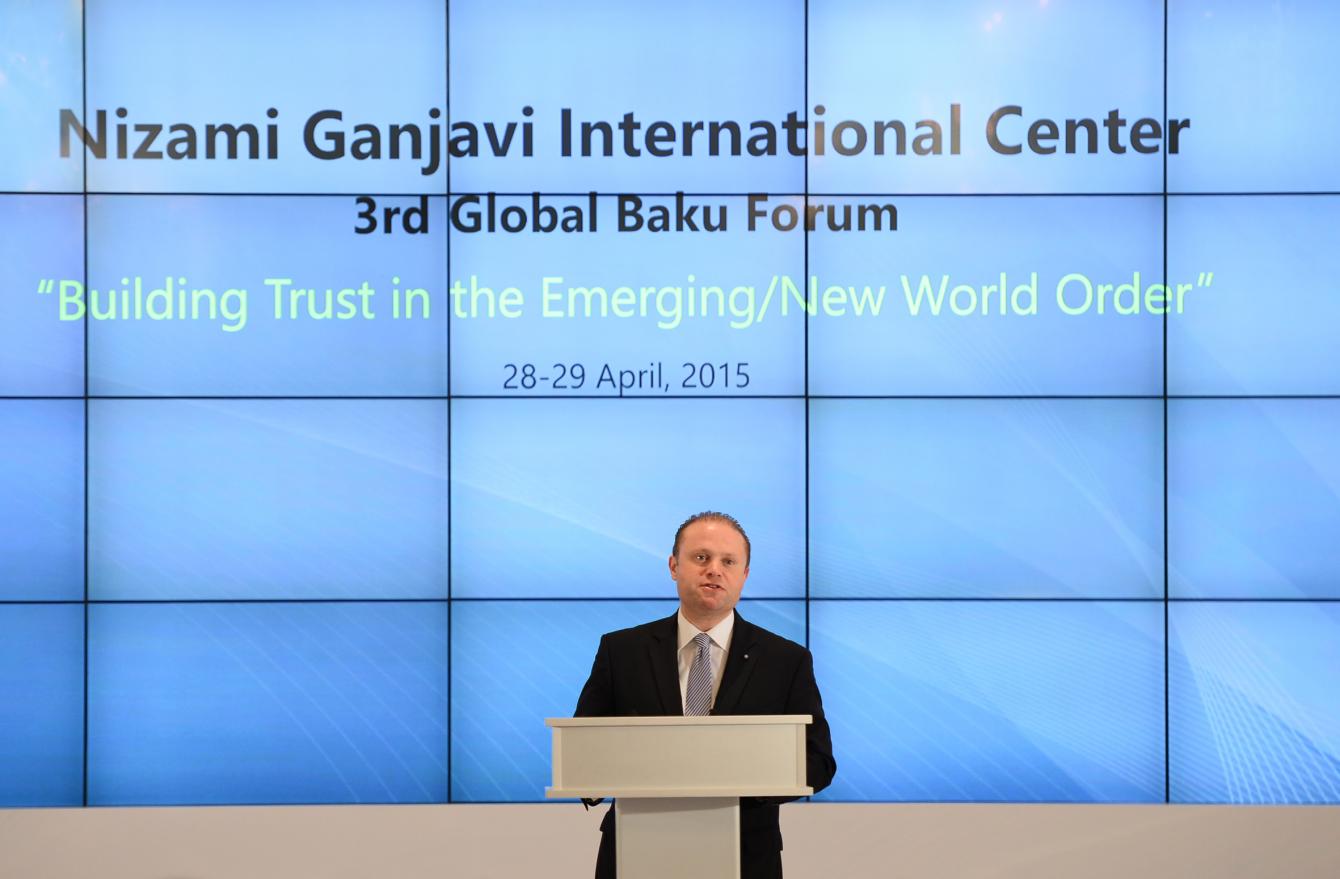
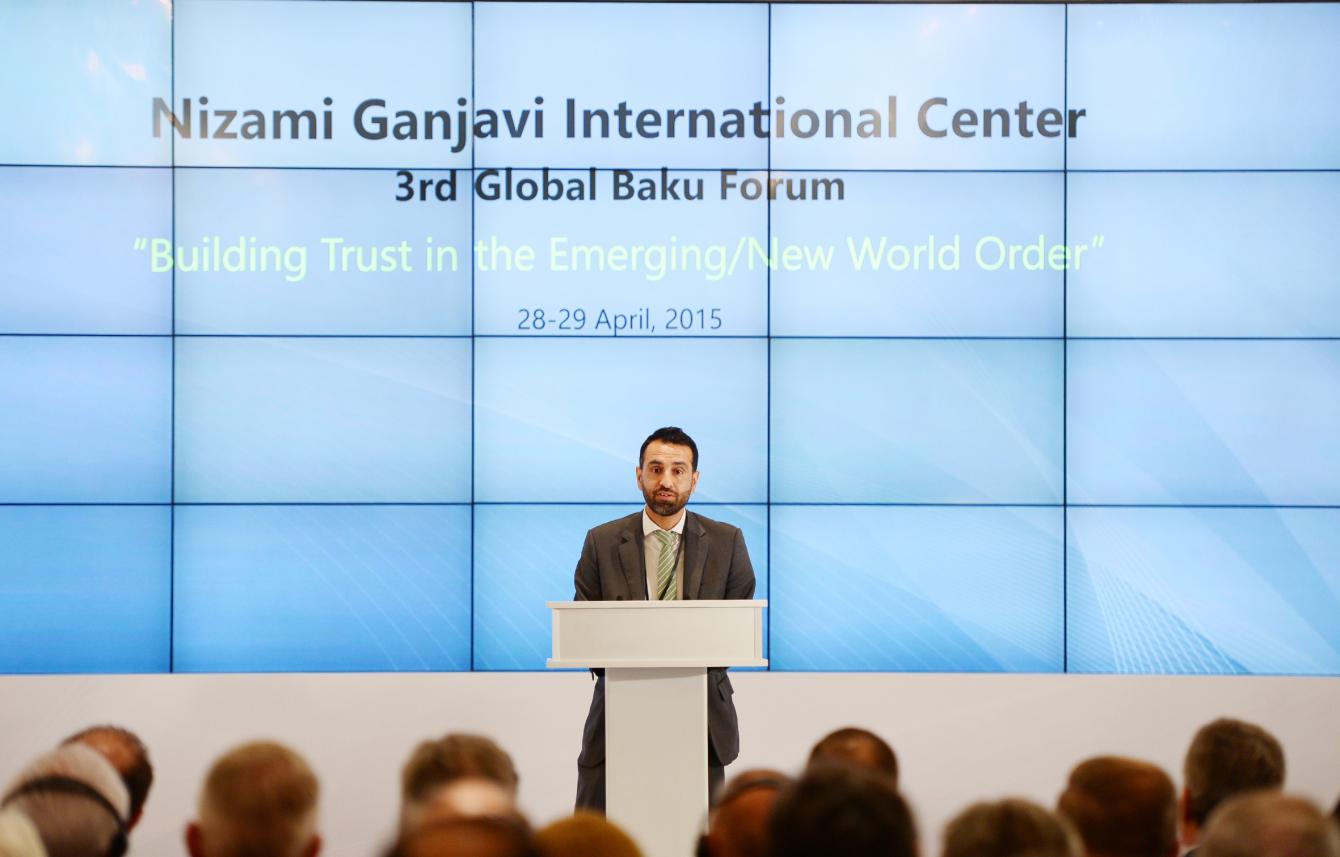
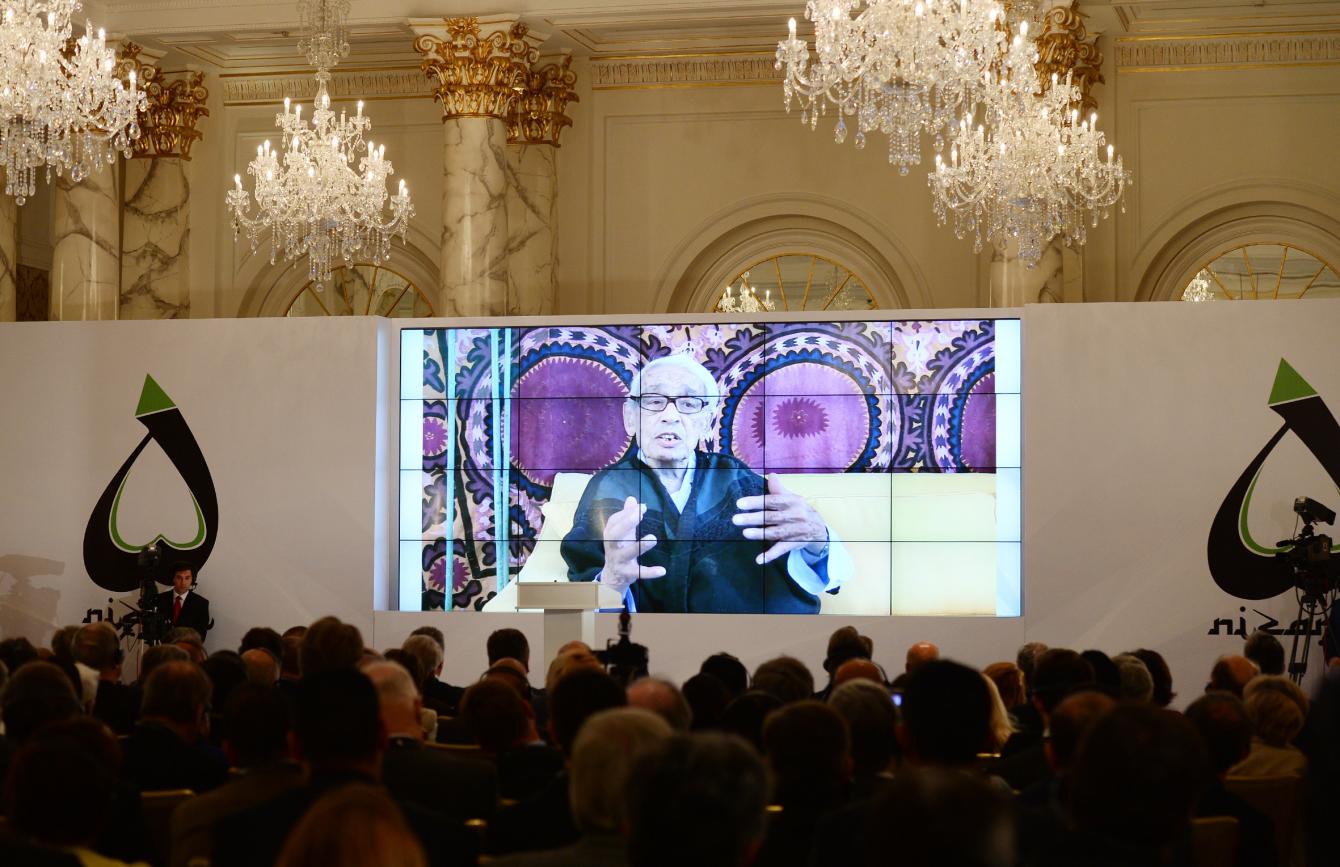
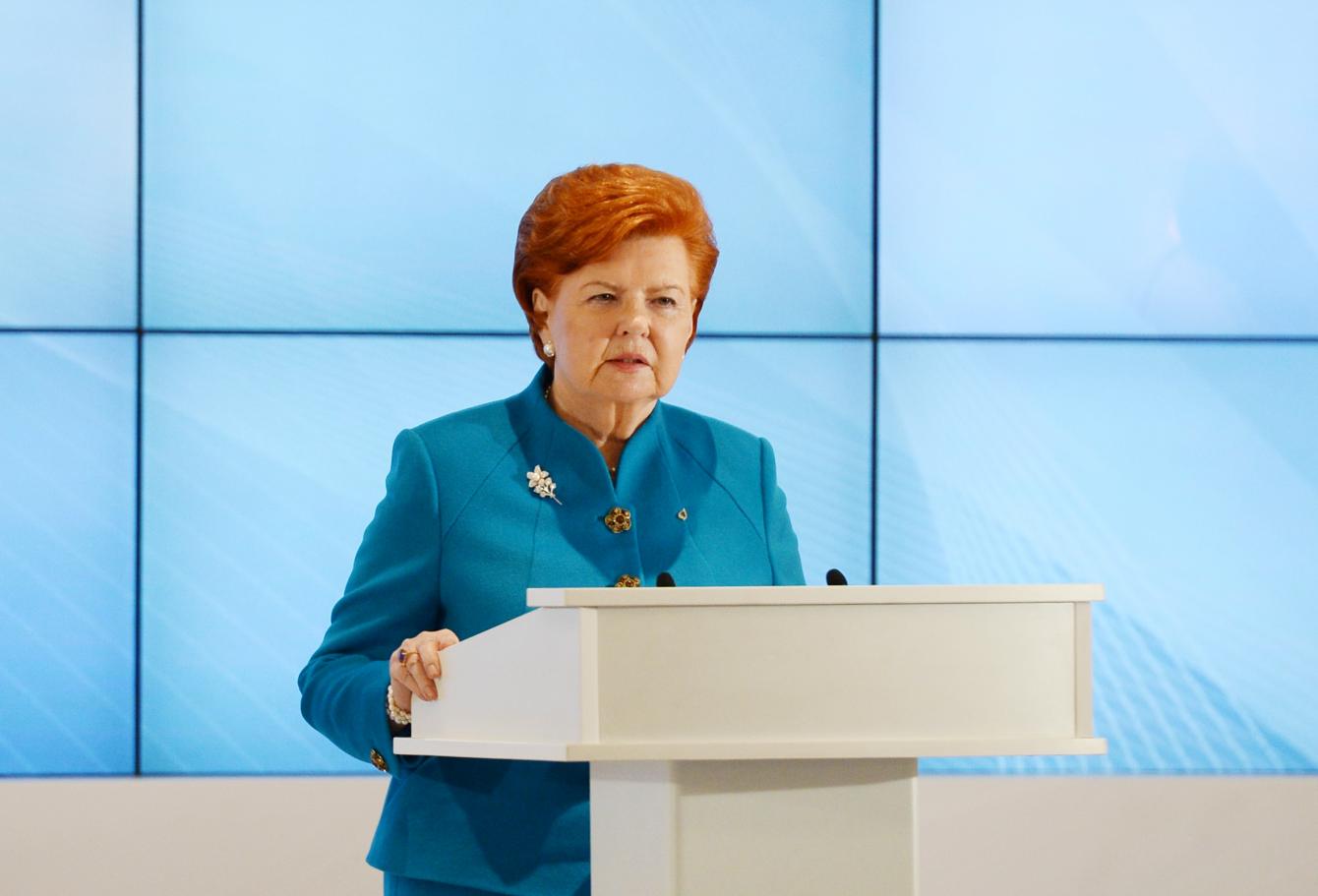
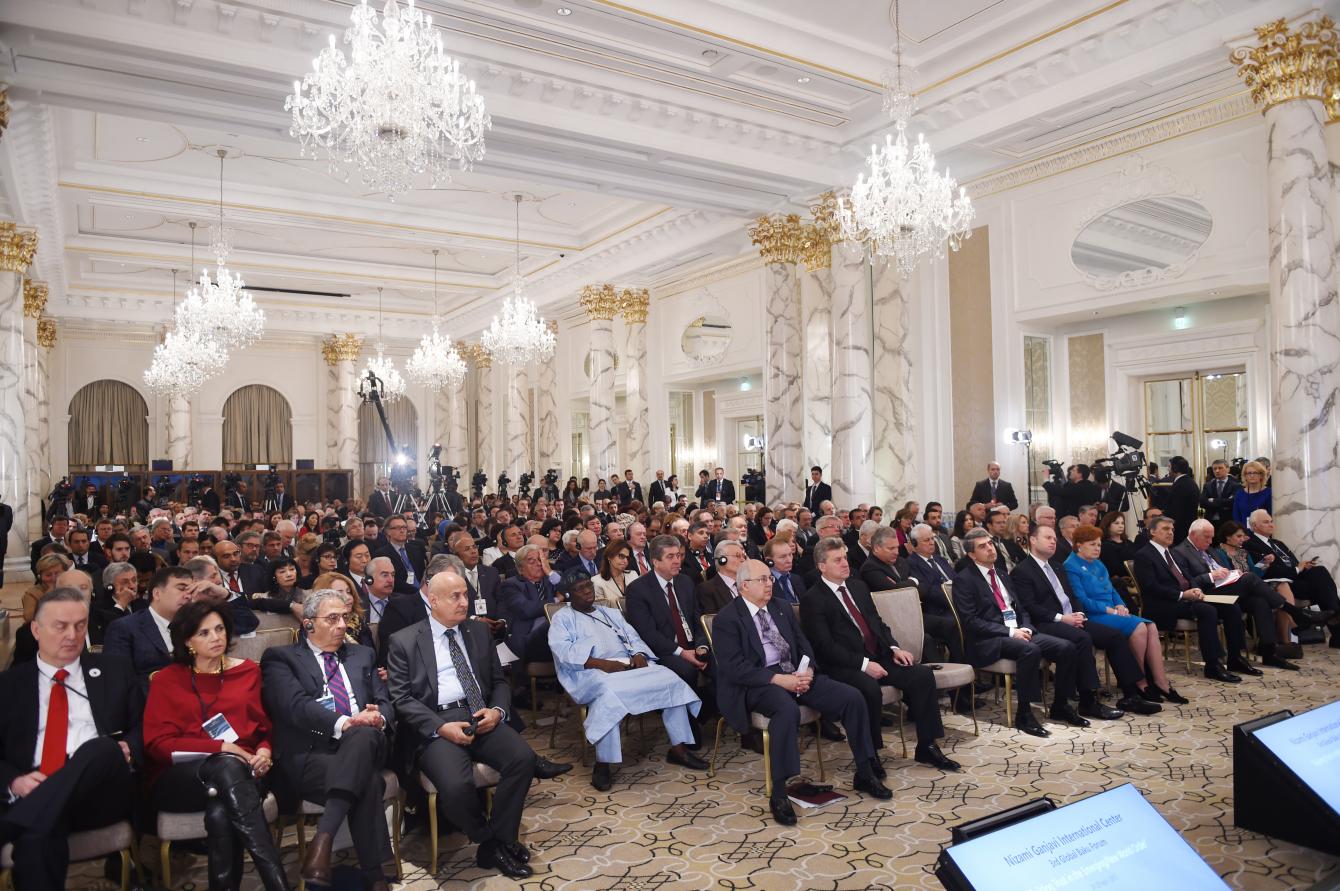
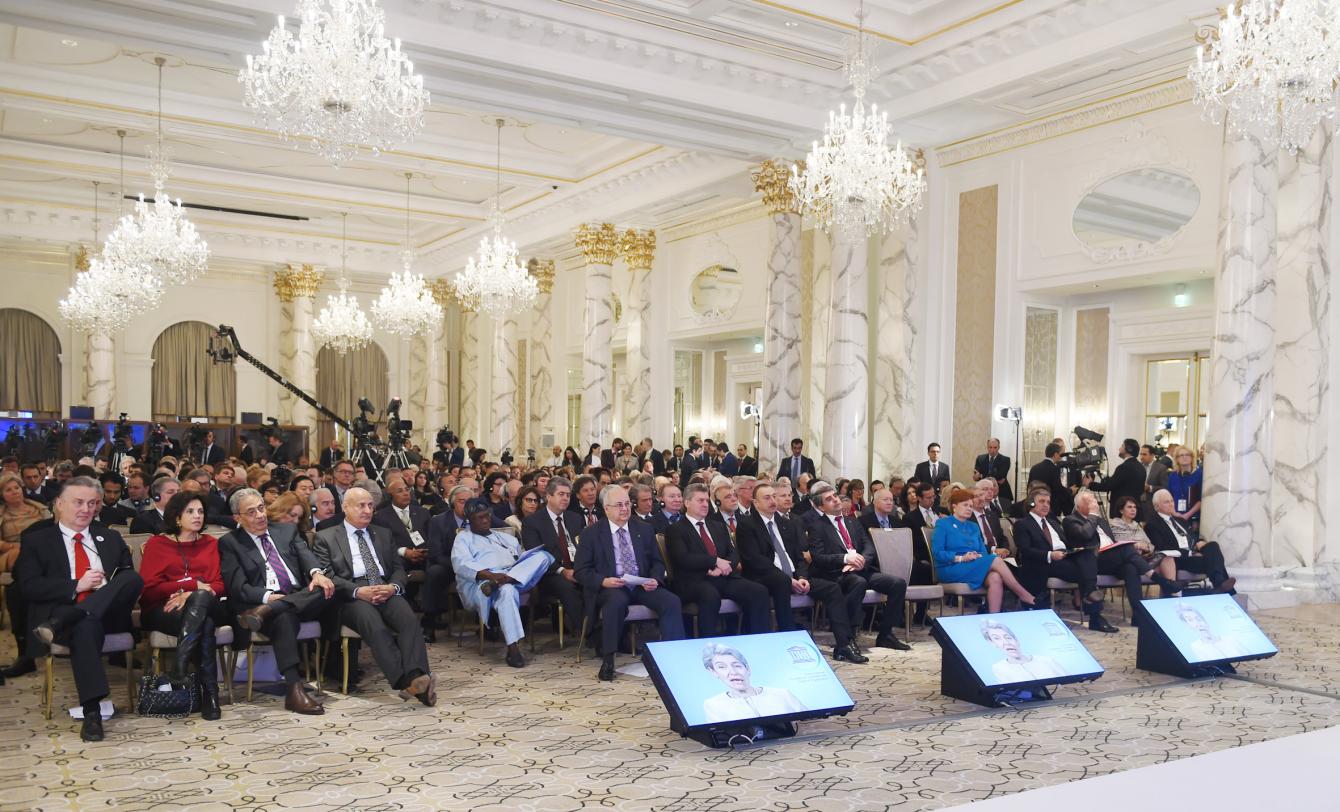
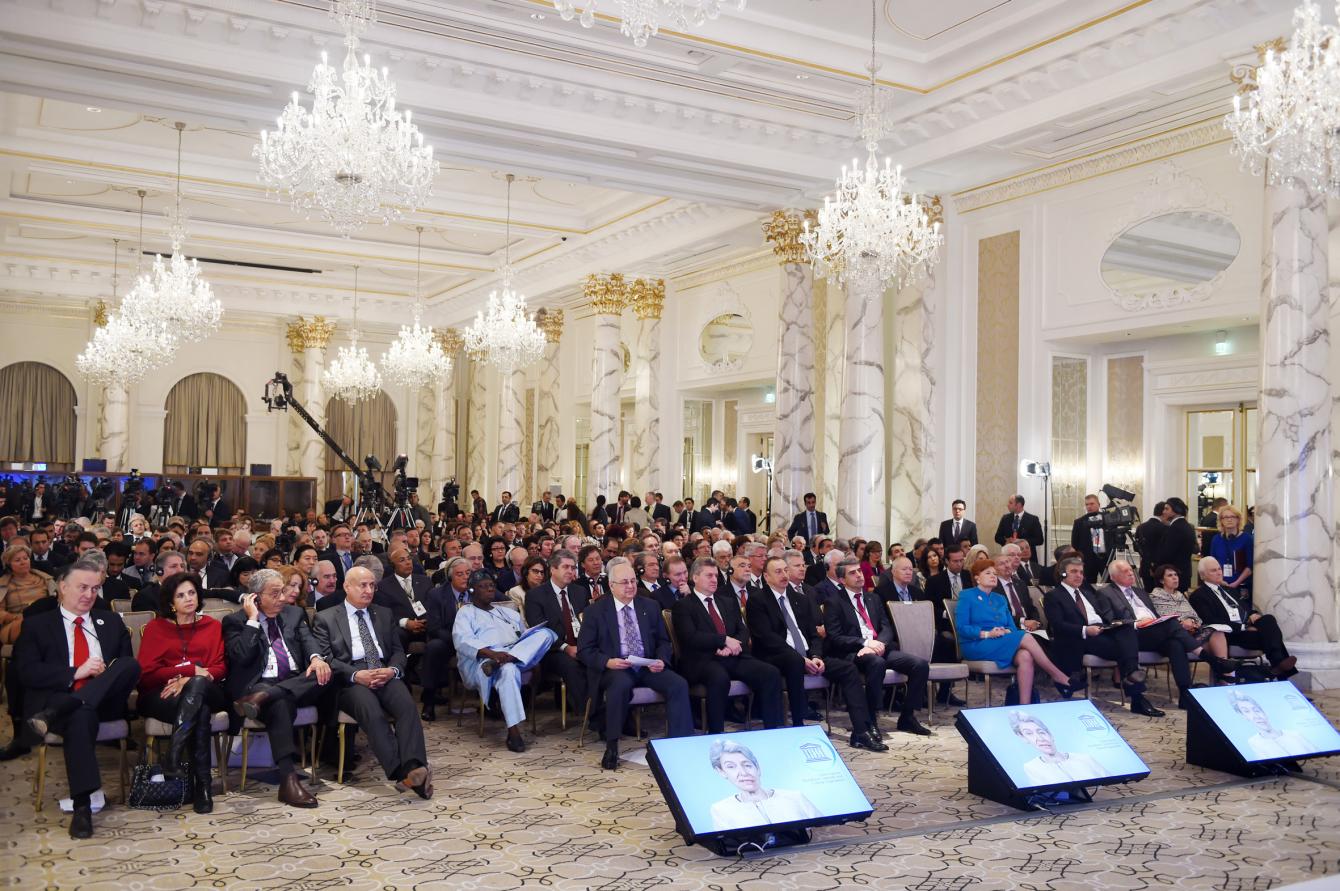
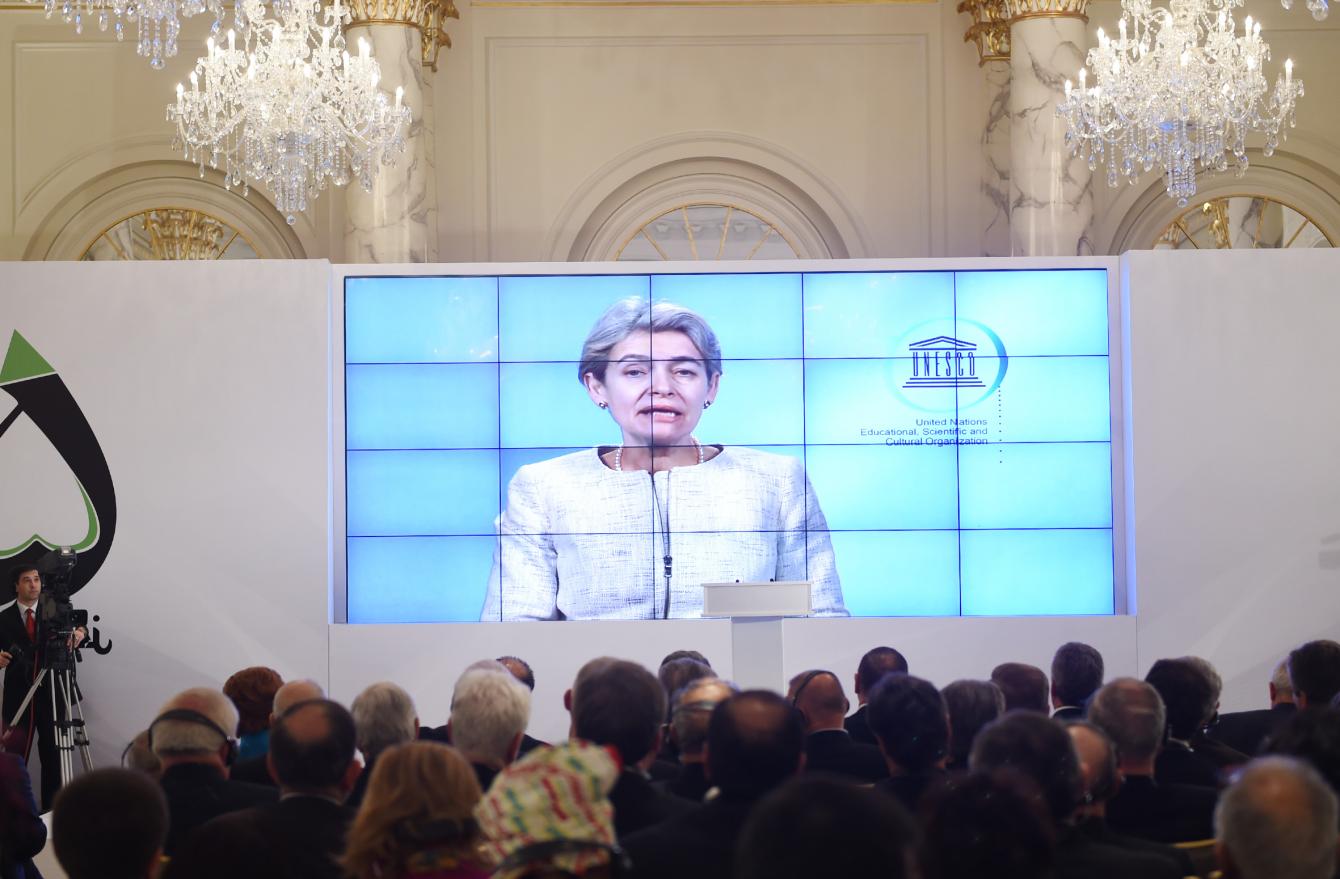
Ilham Aliyev, President of the Republic of Azerbaijan, and Sadyr Zhaparov, President of the Kyrgyz Republic, visited Shahbulag Castle in Aghdam.
25 April 2024, 13:44Ilham Aliyev, President of the Republic of Azerbaijan, and Sadyr Zhaparov, President of the Kyrgyz Republic, toured the Aghdam Conference Center.
25 April 2024, 13:19